#me personally I will not write them having a positive relationship because Jordan’s ruined it for himself truly
Text
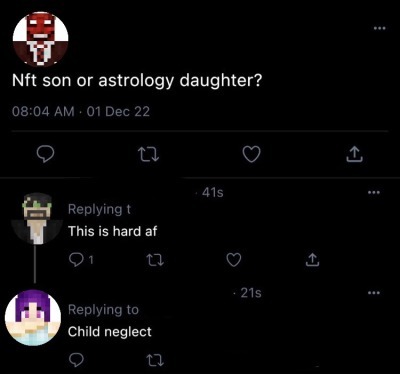

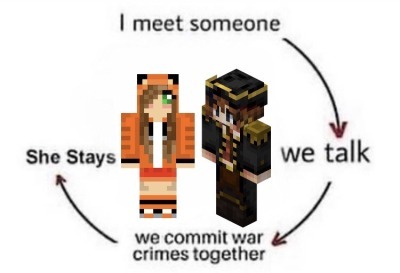
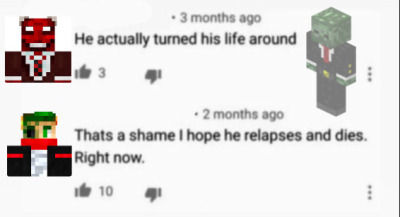
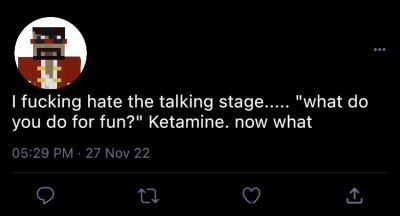


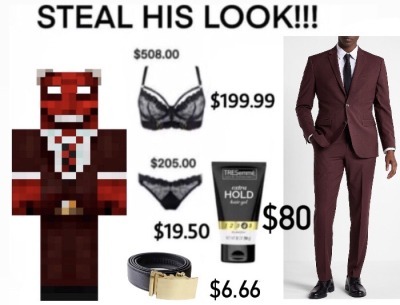
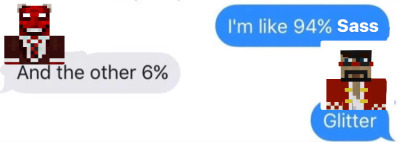
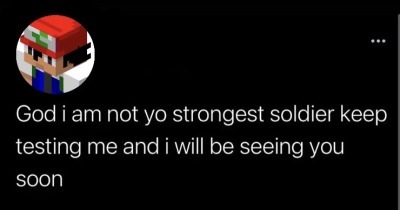


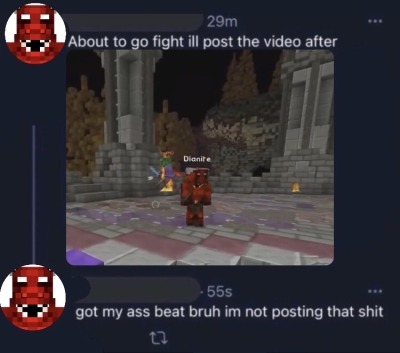
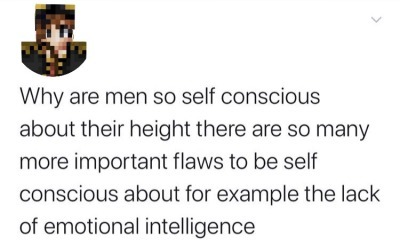
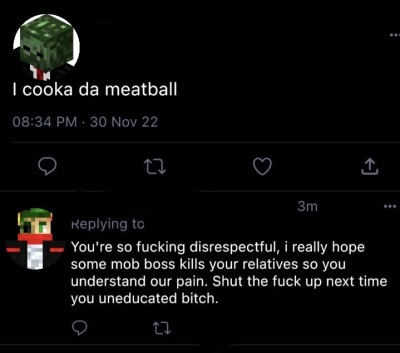

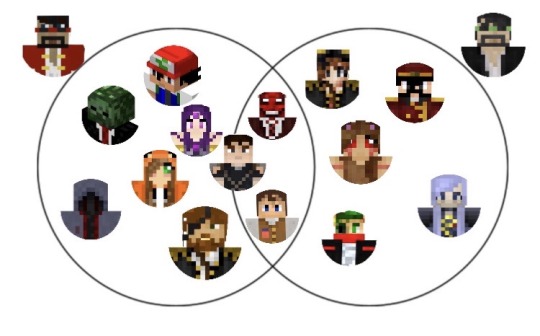
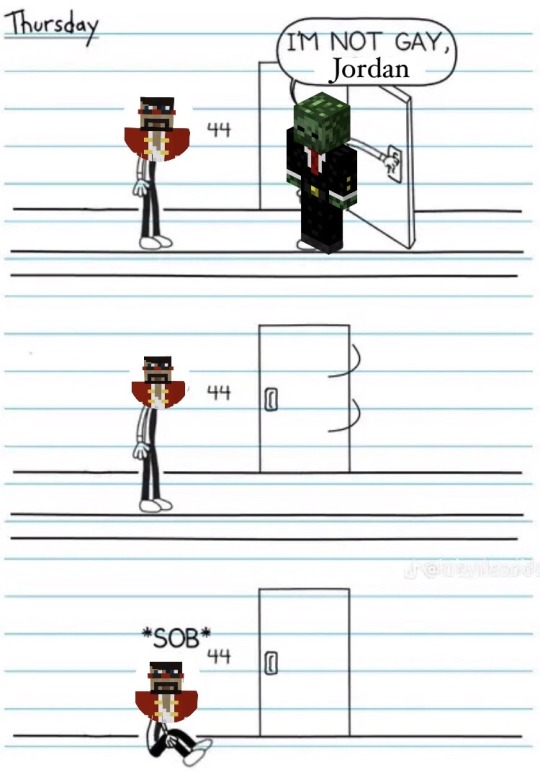

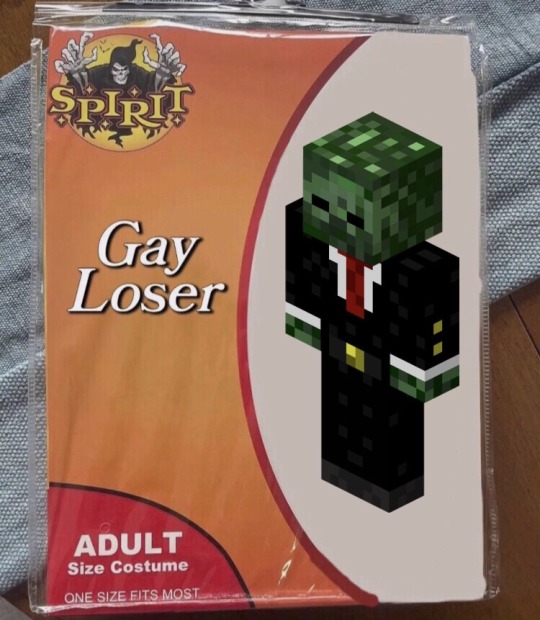

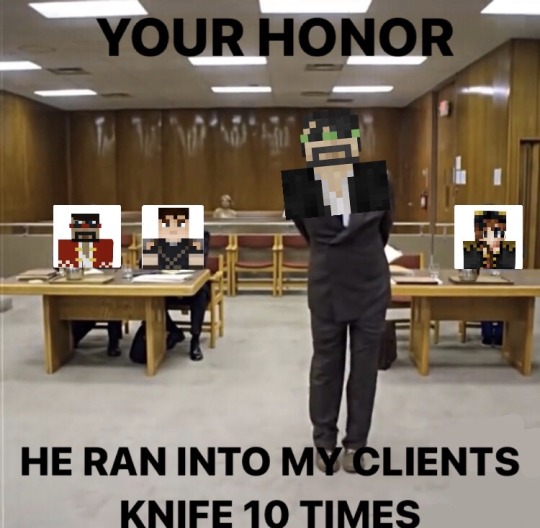
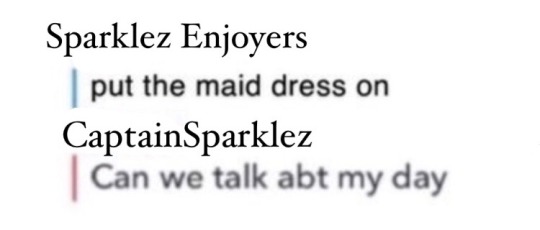


Happy Holidays!!
#Mianite#I’d like to apologize for the tag essay you don’t gotta read all that idk what happened#you know its interesting how red has called jordan ‘skipper Sparklez’ implying that he places them on the same level#especially since both of them have messed with capsize’s ship. but jordan places himself on the same level as capsize#because theyre both captains (which stops being true since capsize demotes him to boatswain)#and capsize makes Tom a captain meaning she places him on the same level as herself (Tom is a captain because he owns a ship btw)#(which btw is why capsize was like ‘you’re leaving my crew?’ to Jordan when he got the ss jerry but technically since he says the ship is#‘for capsize’s fleet’ it belongs to her)#I think the issue with Jordan and Capsize is that he doesn’t actually like her as an individual but as an idea#that idea being ‘having a teammate’ because it’s just been him up until that point.#arguably jordan doesn’t really care about capsizes feelings on things examples of this are#her saying no to getting married but he like ignores that and continues on with the idea that they’re together/ going to get married.#him throwing gold at her and assuming that was all it took to get a date out of her instead of asking (like everyone’s given her gold he#ain’t special) and the ss jerry which was made to impressive her but it’s in a color he likes and also he named it#also him stepping over capsizes boundaries and kissing her#me personally I will not write them having a positive relationship because Jordan’s ruined it for himself truly#I think we as a society need to put more blame on Jordan when it comes to capsizes death by the way#like while he wasn’t the only one in the room BUT he was the only one capable#Tucker was stuck in a hole Tom was being a bitch in the background Red was paralyzed in fear#and when Capsize gets threatened you know what he says? ‘Skipper you gonna do something’ (something along those lines anyways I don’t fully#remember) like he let Furia fucking villain monologue are you serious???#also it’s way more interesting that they don’t get along#or maybe i just like issues idk#feel free to disagree ofc
90 notes
·
View notes
Text
“Invincible”, Season 1 (2021) Review

Somehow both very cool and very fucking stupid :D
About
Created and written primarily by Robert Kirkman (principle writer for The Walking Dead comic and TV show), this Young Adult cartoon basically synthesizes a number of comic book characters (e.g., Superman, Batman, Green Lantern, Hellboy, Wonder Woman, Gambit) and tries to balance their heroism with cynical twists and dark realities. It's an exercise like Brightburn (2019) in that it mirrors existing comic writing all too closely in order to make violent twists. The cool stuff arrives pretty much immediately. You can tell right away that the physics have some level of realism, and it quickly gets serious because of this. The easy comparison would be to The Boys (also by Amazon, also about violent heroes, and also very well-produced). So, if you like The Boys (2019–), you'll probably like Invincible only a little less.
(( Some spoilers but nothing too specific ))
Wrong Focus
But, the stupid stuff comes from the same error that the Kick-Ass movie (2010) made: it focuses on the wrong person(s). In Kick-Ass, the error was focusing on.. well.. "Kick-Ass", an irredeemable loser and waste of screen time. Invincible makes the same mistake, focusing on.. well.. "Invincible", a (so far) irredeemable loser and waste of screen time. So, despite its virtues, this show cannot escape that it made the decision to go for the Young Adult viewing demographic. It reminds me of Alita: Battle Angel (2019) in that way too: some very cool adult concepts ruined by the dramatic devices of unrepentant teenage stupidity and irrelevance. I didn't even like that stuff when I was a teenager, though Jordan Catalano gets a pass.
Main Cast and Characters
The supporting characters were also very stupid. The most annoying was definitely Amber Bennett (voiced by the otherwise cool Zazie Beetz from Deadpool 2 (2018) and Joker (2019)),

who is supposed to be attractive somehow to Mark Grayson ("Invincible", voiced by Steven Yeun, who played Glenn on The Walking Dead)

despite the fact that she constantly judges him, fails to understand him, often fails to give him any kind of benefit of the doubt, and continues to scowl at him and be hurtful towards him even when she has information that should change her outlook towards him. And because she is part of the love triangle shared between herself, Invincible/Mark, and "Atom Eve"/Samantha (voiced by the awesome Gillian Jacobs from Community (2009–2014)),

audiences simply have to bear with it that Amber's annoying character will be present and wasting time until Mark can realize that Amber is in fact toxic and that Eve actually understands him and can improve him in more positive directions. That love triangle should have been a 20-minute distraction, but I'm guessing that it will eat up a season or two more, especially if the writers become cowardly and fail to change things for fear of messing up a perceived "winning" formula. In my ideal story line, they would skip ahead 10 years, drop the teen drama, the love triangle, and the stupid jokes and have Invincible and Eve paired in defense of Earth, with the main tension being from their worry that the other would be horribly gored in front of them during lethal fights against cosmic enemies ;)
Aside, I am aware of Amber’s motivation for being a bad person, I just think her justification is not based in understanding, empathy, and a regard for the gravity of Invincible’s situation. In a strict political sense, Invincible should not commit a lie of omission by keeping her in the dark about his identity — even if for the “noble lie” reason of protecting her — but in a real sense, he is a fucking teenager who just developed his super powers. For her to pretend that he should reveal his entire identity to her — a potentially transformative and even dangerous decision — after a few months of teenage romance paints an absurd portrait of her mind. It does, however, align her with Omni-Man, because where Omni-Man forces Invincible to become an adult in the fighting sense (pushing with full force early on), Amber forces Invincible to become an emotional adult by getting him to understand that toxic people such as herself need to be given boundaries — and he needs to learn to clearly delineate and communicate his real desires. By knowing that he does not want Amber, people who regiment his free time, or people who do not suit him, for instance, he can realize why Eve was an obvious decision: Eve understands, can make time when they have time, and will let him find his decisions. Part of a coming-of-age story tends to be realizing what one actually wants, and Invincible’s hesitation in telling Amber his identity shows that he does not truly want her. This separates Invincible from, say, Spider-Man, who avoided telling Mary Jane his identity not because he did not want her but because he wanted at all costs to protect her.
The next most annoying character has to be Debbie Grayson (voiced by TV-cancer Sandra Oh and who luckily was not animated to look like the real Sandra Oh and who should have been voiced instead by Bobby Lee due to Lee's successful MadTV parody of Sandra Oh).

Debbie basically fills the role of Skyler in Breaking Bad, except that Debbie's character tends to be slightly more understanding before her inevitable and toxic Skyler-resentment and undermining behavior. Despite having an 8-episode arc of change, Debbie's character flips too quickly and lacks the empathy and Omni-Man motive-justifying that would make her interesting (the comic's development may vary). For instance, if she refused to believe that Omni-Man meant his own words, that would make her empathetic and perhaps virtuous even if misled, but instead she dropped their "20 years" of understanding after viewing Omni-Man in action, which makes her appear shallow, easily manipulated, and unsympathetic. That was a definite "Young Adult" genre move because it shows immaturity by the writers to break apart a bond of 20 years so quickly. Mediocre teens might accept such a fissure because their lives have not yet seen or may not comprehend that level of time, but adults know that even long-standing and problematic relationships (which, beyond the lie, Omni-Man's and Debbie's was not shown to be) take a lot of time to break — even with lies exposed.
Omni-Man
The biggest show strength for me was of course Omni-Man, who in a success of casting was voiced by J.K. Simmons in a kind of reprisal of Simmons' role as Fletcher from Whiplash (2014).
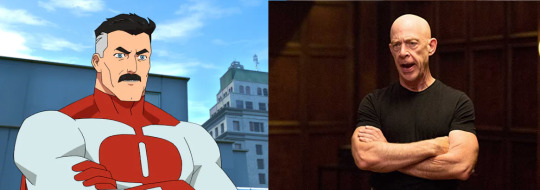
The Fletcher/Omni-Man parallel shows through their being incredibly harsh but extremely disciplined and principled, forcing people to become beyond even their own ideal selves (this via Omni-Man's tough-love teaching of Invincible — comically, Omni-Man was actually psychologically easier on Invincible than Fletcher was on Whiplash's Andrew character). Despite the show's attempts to villainize Omni-Man, he, like Fletcher and also like Breaking Bad's Walter White, becomes progressively more awesome, eventually representing a Spartan will, an unconquerable drive, and a realistic and martial understanding of a hero's role.
To the show's credit, while it wrote Omni-Man to be outright genocidal and from a culture of eugenicists (again, Spartan), they could not help but admire him and his "violence" and "naked force" (for a Starship Troopers reference), giving him a path to redemption. That redemption comes in part because — despite the show's attempt to be often realistic and violent — its decision to be directed at young adults via dumb jokes, petty relationship drama, the characters’ reckless lack of anonymity and security in their neighborhood (loudly taking off and landing right at the doorstep), and light indy music also made the portrayed violence far less literal. With a less literal violence, the real statement becomes not that Omni-Man really did kill so many people (though he certainly did kill those people within the show's plot) but that he was symbolically capable of terrible violence but could be reformed for good. That's the shortcoming with putting violence under demographic limitations. If it's a PG-13 Godzilla knocking down cities, the deaths in the many fallen skyscrapers don't matter so much (the audience will even forgive Godzilla for mass death if it happens mostly in removed spectacle), whereas if it's Cormac McCarthy envisioning a very realistic fiction, every death rides the edge of true trauma.
By showing light between the real and the symbolic, it is much easier to identify and agree with Omni-Man. For instance, when Robot (voiced by Zachary Quinto of Heroes and the newer Star Trek movies)
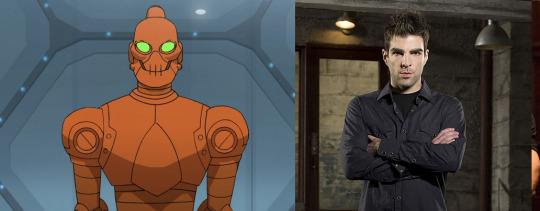
shows too much empathy for the revealed weakness of "Monster Girl" (voiced by Grey Griffin), the audience may have thought, "Pathetic," even before Omni-Man himself said it. And this because Omni-Man knows that true and powerful enemies (including himself) will not hesitate to use ultra-violence against these avenues of weakness. "Invincible" can make his Spider-Man quips while in lethal battles, but he does so while riding the edge of death — something that Omni-Man has to teach Invincible by riding him to the brink of his own.
Other Cast/Characters and Amazon's Hidden Budget
It was impressive how many big-name actors were thrown into this — a true hemorrhage of producer funding. Amazon has so far hidden the budget numbers, perhaps because they don't want people to know that the show (like many of its shows) represents a kind of loss-leader to jump-start its entertainment brand.
Aside from those already mentioned, the show borrows a number of actors from The Walking Dead (WD), including..
• Chad L. Coleman ("Martian Man"; "Tyreese" on WD),

• Khary Payton ("Black Samson"; "Ezekiel" on WD),

• Ross Marquand (several characters; "Aaron" on WD)

• Lauren Cohan ("War Woman"; "Maggie" on WD)
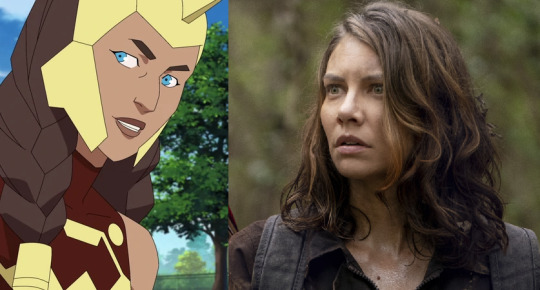
• Michael Cudlitz ("Red Rush"; "Abraham" on WD)
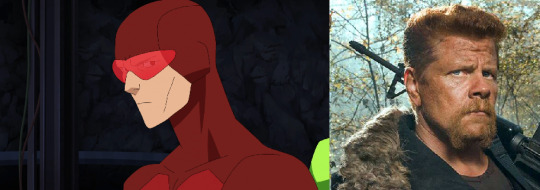
• Lennie James ("Darkwing"; "Morgan" on WD)
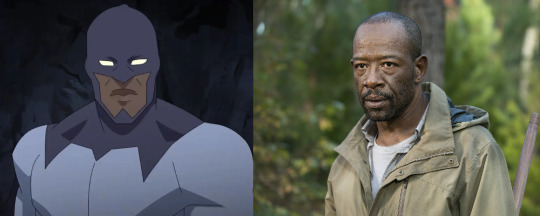
• Sonequa Martin-Green ("Green Ghost"; "Sasha" on WD)

There were also connections to Rick and Morty and Community, not just with Gillian Jacobs but also with...
• Justin Roiland ("Doug Cheston"), who voices both Rick and Morty in Rick and Morty,

• Jason Mantzoukas ("Rex"),

• Walton Goggins ("Cecil"),
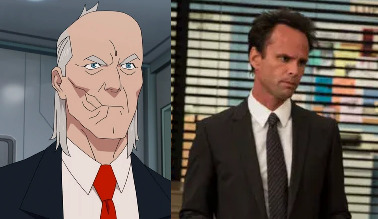
• Chris Diamantopoulos (several characters),

• Clancy Brown ("Damien Darkblood"),
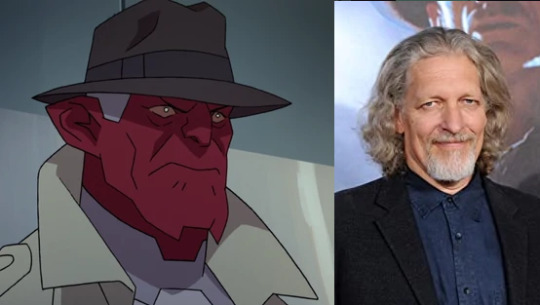
• Kevin Michael Richardson ("Mauler Twins"), and

• Ryan Ridley (writing)
That's a lot of overlap.
They even had Michael Dorn from Star Trek: TNG (1987–1994) (there he played Worf) and Reginald VelJohnson from Family Matters (1989–1998) and Die Hard (1988), and even Mark Hamill. Pretty much everyone in the voice cast was significant and known. Maybe Amazon got a discount for COVID since the actors could all do voice-work from home? ;)
Overall
Bad that it was for the Young Adult target demo but good for the infrequent adult themes and ultra-violence. Very high production value and a good watch for those who like dark superhero stories. I have heard that the comic gets progressively darker, which fits for Robert Kirkman, so it will likely be worth keeping up with this show.
23 notes
·
View notes
Text
We Are Who We Are Overall Thoughts *spoilers*
This review will be discussing briefly some of the episodes so far, so SPOILERS
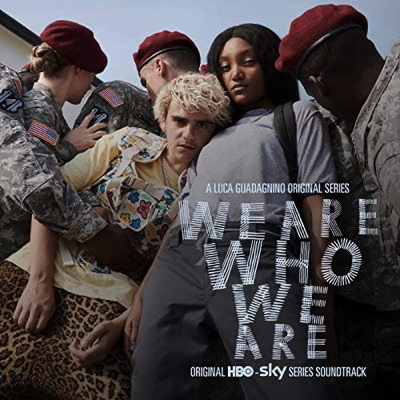
So I started watching the HBO original series, We Are Who We Are, and I am conflicted. When I initially watched it, the dialogue made it hard for me to enjoy it so I stopped. Then after a couple of weeks after its airing, I thought, what the hell? And this time, I was pleasantly surprised. I always maintain the belief that pilot episodes are either boring, messy, or just bad so I try to push past it in order to get to the good shit. The pilot for We Are Who We Are was...I’m not sure how to explain...different? It certainly wasn’t bad and it made an impression on me, but this show as a whole is hard to limit by just a few words. It’s really something that you should watch and experience yourself.
It was only after the first 3 episodes that I began to understand the tone and mood that Luca Guadagnino was trying to convey. A lot of the time, the dialogue is abrupt and choppy and can make no sense. It can be frustrating, especially when you have two characters that aren’t communicating effectively. But I think that was the point. Guadagnino is a very realistic director, he captures the most realistic elements in a film. A lot of the conversations between characters is meant to emulate real life. Like, what the hell do you say when a conversation becomes awkward? Well, nothing sometimes.
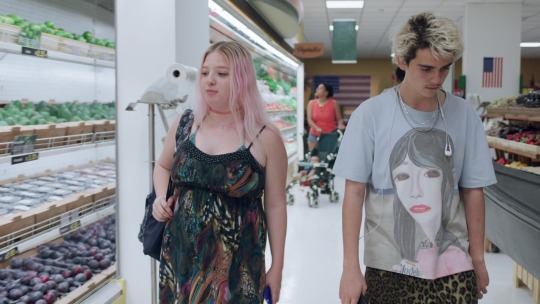
While Guadagnino’s typical cinematography may suggest whimsy, in WAWWA’s case the small structured and synthetic model of the military base is juxtaposed to the very concrete characters. When I started to view the show less as simply a televised airing of fictional characters and problems, and instead looked at them as people, I began to really enjoy it.
Take the main character of Fraser, played by Jack Dylan Grazer. Fraser is meant to be seen as an extremely complex and troubled kid, but the difference between him and every other teen in a coming-of-age drama is that he isn’t polished. His drinking and drug habit isn’t framed as romantic or beautiful, in fact most of the time it’s portrayed as his weakness of sorts. In the first episode, Fraser has one of his mothers drive him home after getting pretty wasted and Luca graces us with a direct shot of him throwing up. And before that, Fraser is stumbling on a bridge when he drunkenly falls and cuts his face. Everything the character does is messy, uncoordinated, yet extremely real and relatable. Hell, in one shot you can clearly see him do a Naruto run!
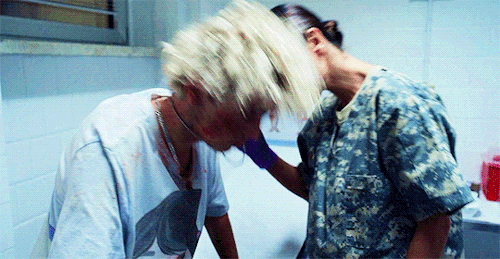
Caitlin/Harper is a character that I enjoyed watching, as well. Jordan Seamon did a fantastic job and I really connected with their character. Initially we see Caitlin as this mysterious girl, and in the pilot we are meant to assume that their relationship with Fraser is supposed to develop into a romantic one. This is not the case as it seems that Caitlin is trying to come to terms with who they are. The biggest shift in Caitlin’s character isn’t their friendship with Fraser but probably when they get their period.
This was a moment that even I related to, even though I am cis when I first got my period I didn’t tell my mom until the day after. The possible confusion and shift in their reality that Caitlin felt was only heightened with the conflict of their boyfriend wanting to be more physically intimate, and Fraser’s eventual discover of Harper. I would have like to see exactly why Fraser seemed drawn to Caitlin. I’m assuming viewers were supposed to think that Fraser is attracted to her, or something. But both Caitlin/Harper and Fraser are queer coded and their respective sexualities are alluded to not being straight. It would’ve made their standing as platonic friends more clear if this had been established stronger.
I definitely think the writer could have devoted more time to giving certain characters proper conversations. It would’ve given more development to certain characters and better context for things. However even without that, there is a lot that the audience is showed that can’t be told through dialogue. The power struggle between Sarah and Richard being one. So far, there hasn’t been any explanation as to why they have a such a volatile relationship other than Richard being a homophobe.
Through deeper inspection, I was able to interpret it as: Richard may heavily resent the fact the Sarah was promoted to Colonel and not him. It is never made clear who has the better credentials, Sarah or Richard, but assuming that she was the one promoted it is a safe guess. This may be highlighted by the fact that Sarah is a women, and also gay. Even before episode 7, it was clear that Richard did not respect her authority. I also interpreted it as Richard being upset that and openly gay women was promoted instead of him, a black man.
Of course this is just based on my own personal knowledge of how the U.S. military can be towards people of color and LGBTQ+. Regardless, the competitive tension between two parents is palpable without needing dialogue to explain.
When conflict happens, I can kind of figure out which characters are going to react and which one’s will stay silent. I think the show is trying to accomplish a drastically realistic and raw series. It took me while to adjust to it, but by maybe the 2nd or 3rd episode, it starts to grow on you. Despite not liking a good majority of the characters, I was very surprised by how invested I was in them.
Like, Danny is my least favorite character because he displays very abusive and explosive tendencies, and doesn’t seem to care about the world around him. However, getting glimpses into his character and seeing how Richard ignores him for Caitlin/Harper, his suicidal thoughts, and how he is trying to reclaim his cultural and religious background makes me empathize with him.
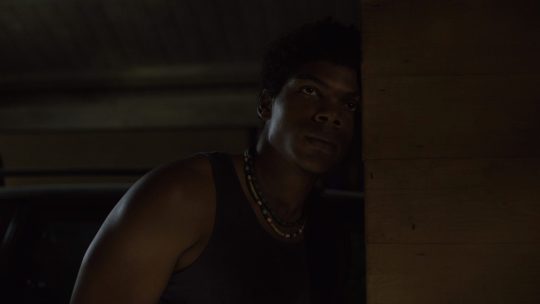
Even though I hate his character, I can see that he is struggling. I appreciate the way that this show freely shows dark skinned black boys dealing with mental health issues, and personal development. Rarely are issues like suicide talked about in the black community, so seeing Danny talk about it and Craig offering(admittedly poor)comfort was touching. This is a general vibe that I get from nearly all the characters on WAWWA. I also appreciated the how Danny is actively trying to convert to Islam. In shows, rarely is Islam ever portrayed in a positive manner. Especially when female characters are shown to be struggling with their religion, Islam is shown as this barrier that prevents them from living life. Hopefully it goes without saying that the “taking off the hijab” as a way to show that a female character is “liberated” is overplayed and does not offer any respect to the countless Muslim women who choose to wear hijabs.
Now I think the pacing of some of the storylines could have been handled a bit more gracefully. Like how we jump from Fraser and Harper being kind of enemies(not really but you know what I mean), to just them hanging out in Richard’s boat was jarring. I would have at least liked to see the scene of them talking on the rocks at the beach. It would’ve given more insight on Caitlin/Harper’s character and also on Fraser too. Also how quickly Maggie and Lu(Jennifer but I love the name Lubaba, it’s my aunt’s name)jump into a physical affair. I just would have liked to see a build up of tension between all these characters but I don’t think this entirely ruins the plot.
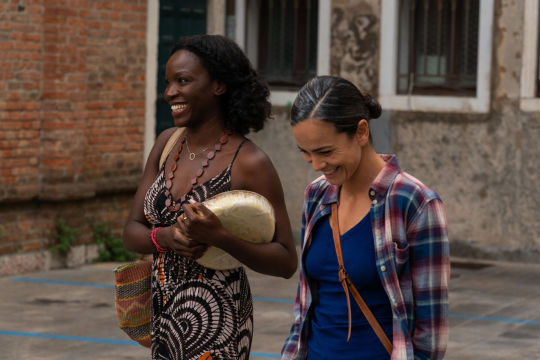
I was very iffy when I learned that the show would be focusing on trans identity and gender and sexuality, but not actually hire a trans male actor. I was afraid that the show would completely botch the experiences of being transgender, and honestly I don’t have the authority to speak on whether or not this affects the quality of the show. I am cisgender, and only can empathize with this particular situation as much as I can. But I would like to hear to the opinion of someone who is trans and elaborate on the ways that they did/didn’t like Jordan Kristine Seamón’s portrayal.
Now at the time I’m writing this, the season finale has yet to come out. But I’d also like to briefly discuss the most recent episode and how it developed Jonathan and Fraser’s relationship. I was VERY worried that Guadagnino was going to take their relationship in the direction of inappropriate. While nearly all the depictions of Jonathan and his actions have been trough Fraser’s pov, it didn’t stop me from side-eyeing some of the interactions they shared. Of course after it was mentioned that Jonathan was supposed to be in his late 20s, nearing 30 I was immediately uncomfortable with the very flirty behavior he exhibited.
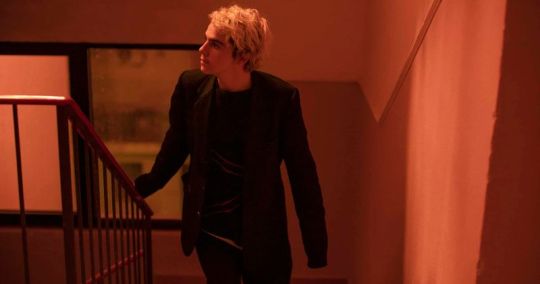
So when the scene of Fraser going up to his apartment after Craig’s death, I was very on edge. If Guadagnino had gone the extra mile to show an even larger age gap then I would’ve been pissed. While I enjoyed Call Me By Your Name, the implication that sexual relationships between barely legal teenagers and adults well into their 20s was sensual is something that I see as very weird now that I’m older. So seeing Jonathan as the object of Fraser’s affections made me extremely warry.
And honestly, I’m still surprised that the scene even happened in its entirety. I’m sure that Jack was not in any danger of being exploited but there were definitely points while watching I thought, what the fuck is going on? I was very worried that it would escalate, but I was happy to see that Fraser was the one who stopped it from going further. It made sense to me that this scene took so many liberties to be as graphic as possible without being too graphic, in order to show why a situation like that would be scary and confusing for Fraser. It wasn’t lost to me that Marta and Jonathan were the one’s initiating all the sexual advances. They held all the power in that scenario, even more so because Fraser is younger and has the tendencies to not make the best decisions. Though it seemed that Fraser was trying, he knew that the situation was fucked up.
I’d like to hear what JDG felt and thought doing this scene. What was his character’s thought process?
I’ve seen a lot of people compare the show heavily to CMBYN, which is fine. Besides certain cinematic parallels that people pointed out, I don’t see the clear comparison. CMBYN is more of a love story and it’s more polished than WAWWA. Now when I say tat, I don’t mean it as a negative. Rather, We Are Who We is obviously more devoted to realism and its characters. I appreciate the inclusion of more LGBTQ+ people and black main characters with development, something that CMBYN lacked. And for some people who didn’t like the show based solely on the fact that it wasn’t a CMBYN tv show, I suggest just going into it with no expectations and enjoy the mess.
And I’d also like to take a moment to commend Jack Dylan Grazer for his job in We Are Who We Are. All of the main cast are amazing actors and actresses and did a really good job bringing their characters to life. Though, I had always associated JDG with supporting roles that, while highlighted his acting talent, only put him in a one-dimensional light. As good as It 2017 was, JDG’s role of Eddie is only meant to be seen as a comic relief. In WAWWA, I was able to forget that he was teen actor, Jack Dylan Grazer, and really see him as Fraser. It’s worth mentioning that in a GQ interview, Grazer also mentioned how this role made him reevaluate is approach to acting.
And after reading an interview he did with a Interview Germany, with him saying he spent months in Italy reading the script and trying to perfectly craft this character, I was immensely impressed. I hope that he knows that all his hard work payed off and made a really dynamic and interesting character. I really hope that in the future JDG continues with more mature or multi-dimensional roles because he displayed that he has the talent to do so. Him being so young makes me optimistic in knowing that he is definitely going places in his career. I also hope that there will be a season 2 of WAWWA because despite having hour long episodes, the show still felt way too short. There is a lot about Fraser’s character, and all the others’ characters, that I want more information and analysis on.
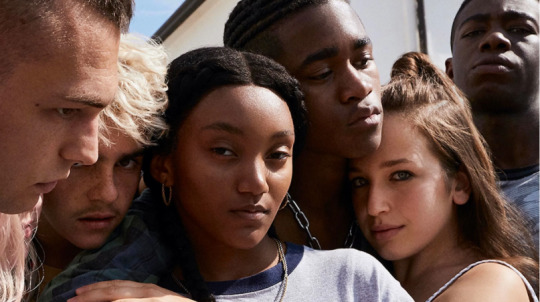
#We Are Who We Are#wawwa#wawwa spoilers#wawwa hbo#jack dylan grazer#jordan seamon#luca guadagnino#series review#I lived for the fact that Fraiser is an absolute mess cuz same#chloe sevigny#faith alabi#tom mercier#jonathan wawwa#hbo max#coming of age#kid cudi#spence moore ii#corey knight#francesca scorsese#alice braga#i can do a in-depth character analysis cuz i feel like there is a lot to every character that most people haven't addressed#really enjoyed it#if it doesn't get renewed im gonna fucking cry#fraser wilson#caitlin poythress#sarah wilson
44 notes
·
View notes
Text
The Music of What Happens Book Review

The Music of What Happens by Bill Konigsberg Book Review
I don’t think I like this book.
I know that’s a strong statement right off the bat, but it’s mostly true. However, there was also something about it that I didn’t quite hate and, as usual, I will try my very best to put forth both the positives and the negatives of this read into some sort of subjective semblance of rationality.
Now, firstly I’d like to thank @chapterhappy98 for the recommendation. I love getting book recommendations (just not when people actually buy me books-see previous reviews) and this one seemed totally up my alley.
For a novel I’d never heard of before it had a lot of components that excited me. An LGBTQ+ romance? I’m here for it. One of the main characters being half-Mexican and half-white? Love the representation. A cute plot centered around summer and food trucks? Yes, please.
All the ingredients were there for a good book, but the way the book was written, the perspective of the characters, and the characters themselves made this a slog for me. On paper, this should have been lauded as a cute fluffy novel with some very deep feels, but instead I found it tedious, aggravating, and thankful that it was at least short.
The positives are everything I mentioned above. The plot itself is cute. Food truck summer romance is not a plot I’ve read before, but it's original enough to be intriguing and cute enough to be endearing. High quality fanfiction fodder right here.
Although the representation could have been better, it was sufficient. I enjoyed the fact that Max’s mother was Mexican while his father was a whiter-than-toast comedian from Indiana. Both Max and Jordan have friends who are white and friends who are not and I enjoyed that Konigsberg portrayed the distinct friend groups as such and that moments of race do come up.
For example, like when Jordan suggests they steal prickly pears from people’s yards and Max shuts it down before the idea can even coalesce because a white boy stealing pears from yards is a hooligan move, a Mexican kid stealing pears from yards is a crime.
Small introspective moments like this were very interesting and added a layer of reality to the novel that I appreciated. On this same route, both Max and Jordan, our two main characters with revolving perspectives, are going through some deep trauma and while it wasn’t amazingly handled, I did appreciate moments towards the end where Konigsberg actually has the characters face what they are going through and take appropriate routes to fix them or start the healing process (acceptance, counseling, etc).
By no means did I think the book handled sensitive topics such as rape, addiction, bullying, and self-esteem issues well, but at the very least, most of the issues were adequately addressed and on the right path towards healing and rehabilitation which is more than I can say for some other novels.
Now, for the negatives. Buckle up, people.
First off, the writing.
I found it abhorrent. I don't know if this is just Konigsberg’s style of writing, but it did not vibe with me at all. I found his writing and dialogue superfluous, cheesy, and gag-inducing.
To me, this is not how real people talk, think, or interact, but instead a grown ass man’s idea of how teenagers think, talk, and interact. It made me truly wonder if Konigsberg has actually ever met a teenager in his life.
As a high school teacher, I interact with teenagers on a daily basis. I know how they talk and interact, and through their journals and papers, I can generally grasp at least a preview into how they think.
It’s like Konigsberg took every adolescent stereotype that exists and stuffed it onto his pages with mediocre words and subpar humor. The Music of What Happens is a pantomime of the teenage experience and I found it extremely irritating.
Secondly, the perspectives of both Jordan and Max are maddening and irksome, although Jordan more so I have to admit. Both of these characters suffer from what I call “Woe is Me” syndrome. This is the idea that making a character have a sad or tragic backstory or circumstances also makes them deep and complex.
This is so far from the truth it hurts.
Trauma and tragedies are not simply fodder to build a cheap and easy way for a character or a plot to build depth. It should be handled with care, with consequences, and with other characteristics built in that are reasonable and befitting of the whole character. Both Max and Jordan were almost laughably tragic.
Max’s parents split up, and while his mom Rosa is the MVP of the book, his dad is nothing more than a useless caricature of the absentee father, so much so that when Max admits to his sexual assault his dad does nothing, but makes a joke and talks about a stand-up routine he has coming up.
Jordan is much, much worse. This boy is the most self-deprecating, pitying thing I have ever read.
(Spoilers ahead for the novel and Jordan’s circumstances).
His friends who he calls his “wives” (cue eye roll) bully him, his mother is a gambling addict with bipolar disorder, he believes he killed his father by giving him a heart attack on his sick bed, and he’s about to be homeless unless he can make money from his dad’s old food truck and save his mortgage.
It’s absolutely ridiculous.
I’m not trying to make light of these issues, but the way Konigsberg handled these characters went like this: “Hmmmm how can I make interesting teenagers? I know! Let’s make everything in their life miserable. Yes, that will make readers care!”
In case you were wondering, no, it didn’t work.
Just because Jordan and Max are tragic characters did not mean I cared for them or even liked them. If the idea was to build complexity and sympathy that absolutely failed. If anything, I felt frustrated by the circumstances, vexed by the way both boys handled their issues, and galled at how the surrounding world allowed it to happen.
In addition, going back to the idea that Konigsberg has never met a single teenager in his life, both Max and Jordan fell into such archetypal teenage tropes that I felt my teeth rotting.
They fell in love after hanging out twice, their reasons for liking each other were abysmal and perfunctory, and if anything, the only reason I actually saw these two working in any way was simply because they were both the only other gay person they knew, which is not even an adequate component.
The romance felt strained and uncomfortable and the “dates” they went on made me laugh with absurdity. Picking up stuffed animals at midnight to put them at the front of the zoo? Who does that? I didn’t find it charming, I didn’t find it unique, and I didn’t find it cute.
I found it odd and unrealistic.
Which, at the end of the day, is what irked me about this book the most: it was unrealistic.
You might say: “Typedwriter! That’s unfair! You read about vampires and fairies and all sorts of fantasy creatures and worlds!”
You’re right, I do. But fantasy and unrealism are not synonyms. Fantasy I love. Even within fantasy worlds there needs to be rules and order. There are still expectations and realistic behaviors and laws that govern fictional creatures and lands.
For a novel that is supposed to depict real life and real teenagers The Music of What Happens edges on the side of surreal for me. Surreal is also fine if that is the targeted result.
In Konigsberg’s case, however, I don’t believe that was the intention. I got the feeling that Konigsberg wanted this to be a real and deep portrayal of love and adolescence and instead I found it ludicrous and nonsensical.
Everything about this book bordered on nonsensical. Two boys running a food truck without any knowledge or prior experience and ending up making thousands of dollars? Okayyyyy, sure. Jordan’s mother’s behavior, gambling addiction, and speech? Preposterous. The way Max and Jordan talked to each other and their friends? Almost like a robot’s depiction of how they think humans communicate.
At the end of the day, this book’s unrealistic look at life, love, relationships, trauma, and consequences ruined it for me. It’s certainly not the worst thing I’ve ever read, but most of this book was just a mindless jumble of words that didn’t form a proper connection to me as a reader.
As listed above, not everything was horrible and I’m not trying to make it out like it was, but for the most part, I didn’t enjoy this book as I stated from the beginning.
As always, this is just my opinion. I still love that it was recommended and I mean no harm to anyone who does love this book. Perhaps if I was a young teenager I would have connected more with the self-deprecating monologues and pity parties. Perhaps if I wasn't so skeptical I could actually believe two sixteen-year olds could pull off a food truck success, but alas I’m not and I couldn’t.
If this book brought out tender feelings and emotions for you, however, I am glad because isn’t that why we read?
Unfortunately, this was not the case for me for The Music of What Happens.
Recommendation: Unrealistic everything made this book toiling drudgery for me. Take the idea of a cute summer romance on a food truck, apply it to your favorite fandom and OTP for a Valentine's Day prompt, and then happily move on with your life without having the need to pick up The Music of What Happens.
Score: 3/10
#the music of what happens#bill konigsberg#ya fiction#YA Books#YA literature#book blog#books#book review#Book Recommendations#YA Book Review#book reccs#ya book rec#book rec#bookstagram#LGBTQ fiction#popular fiction
9 notes
·
View notes
Note
i wanna hear more about your headcanon of declan as autistic (no pressure! only if u want to)
oh ariana we’re really in it now
not all of these bullet points are specifically related to autism bc this just turned into a post about how fond i am of declan. however. autistic declan lynch rights here we go
speech
declanisms
really, keeping a list of action-based conversation starters to meet your goals that all sound like something a caricature of a high-level business executive would say... honey
memorizing clever turns of phrase and the cadence of storytelling
and refusing to ever use this love of language in public lest it make him vulnerable or ruin anything he’s built
having practiced regulating his vocal tone and inflection to make them both as normal and as free of personality as possible
being unable to modulate his vocal tone and inflection when he’s Not actively concentrating on regulating them - speaking impulsively from a place of upset, getting excited about things, etc
physicality
having also practiced his physicality to appear as unthreatening and unobtrusive as possible
mirroring strangers, casual acquaintances, criminal associates
actively schooling himself not to talk with his hands; natural storytelling comes with gesturing and physical involvement
having pleasant conversations and being pleasant to exist around while managing to have absolutely no friends
anxious stomachaches
nervous tics
refusing to allow himself comfortable clothing or a comfortable living space despite seeming to want these things
deciding he can have nice shoes, as a treat (doesn’t have anything to do with neurodivergence i just think it’s cute)
internal emotions
Everything Is Horrible, All The Time, But That’s Fine Because That’s Just How Life Is For Me And I’ve Accepted It
deeply unhappy, deeply bored, deeply exhausted, deeply terrified
given up on dreams and ambitions because they will never be accessible to someone like him (one of those things that in-narrative isn’t autism-related, but sure can be a hashtag relatable feel)
happiness, excitement, joy, any positive emotions are all “dangerous” because they represent a loss of control
zero to one hundred IMMEDIATELY in terms of anger, manic excitement, terror, misery, self-flagellation
constantly self-regulating, compartmentalizing, putting aside, and refusing to act on emotions despite feeling Incredibly Deeply
anxiety
obsessing, catastrophizing, making contingency plans, exploring bad outcomes, regretting past actions literally every single second of every day
aforementioned physical anxiety manifestations
resigned to ronan and matthew’s eventual deaths even when things are Mostly Okay
convinced that if and when something happens to ronan or matthew, it will be his fault
none of these things are autism-related specifically, there’s just something in his repetitive thoughts / methods of self-soothing / ways of internalizing trauma that's..... a feeling
child development
one of those kids who would have been called “precocious”
had developed a system for watching/protecting ronan and trying to convince ronan not to dream things by age five
specific interests in things deemed uninteresting or unimportant
didn’t engage in the same play behavior most kids his age would
got overwhelmed and cried over liking a gift too much
consciously aware of niall’s disdain for him, aurora’s ephemeral nature, and ronan’s dangerousness to himself at age five
some of these things are definitely exacerbated or fully caused by a childhood of emotional neglect and endangerment; autism reading integrates with this rather than replacing it. i strongly feel declan would still have been a “precocious” child with a healthy happy parental upbringing as well
sense of responsibility
extremely stressed by any situation he can’t control
will attempt to control situations beyond his jurisdiction to minimize this
studies so many parenting books after technically becoming ronan and matthew’s caretaker because he has no frame of reference for parenting and does not trust his instincts
“if you want something done right, do it yourself” a life motto by declan lynch
“everything is my fault, all the time” a life motto by declan lynch
“except when it’s dad’s or ronan’s fault” a pretty fair addendum by declan lynch
mental stimulation
so unbelievably bored with his life situation
THRILLED any time he gets to play games or engage in clever conversation - seen a little in his “crime makes me feel alive” vibes, his back-and-forth banter with jordan
won’t let himself get engaged in things because passion feels unsafe
enjoys himself for about one hour of one single night and then immediately starts cracking to pieces about how living in a constant state of mental dissatisfaction is killing him slowly
somehow manages to be surprised by this turn of events
interests
he hides art he loves in a murder attic like a feral cat who refuses to eat in front of people. i don’t even need to get into this
absolutely immediately enchanted to the point of self-labeled stupidity by watching jordan paint
infodumping about art history
trading art interests with jordan bc he’s legitimately interested and excited by what she knows and feels passionate about
this entire post should just be the murder attic. declan oh my fucking god
aforementioned collecting of language he likes
the whole tyrian purple thing. again. declan oh my fucking god
emotional intimacy
craves emotional intimacy but is TERRIFIED of being known and/or being rejected
is convinced he can never and will never have emotional intimacy in his life
has all the stamina of a wet tissue in terms of keeping his emotional secrets when jordan cottons onto them
gets annoyed by relationships with people who want emotional connection but continues playacting through the motions of said relationships in the hopes of being less lonely
comforting people / expressing genuine care
declan attempted to dispense comfort. “everybody dies, matthew”
i have to put attempted to dispense comfort on the list again. oh my god. to declan’s brain, emotional comfort is a vending machine that’s eaten ten dollars in a row and is now falling on him after he made the mistake of shaking it
declan regretted saying anything. [immediately says the worst thing possible]
write your routine, ronan. now. now. write it. write it down. (because i’m worried you’re going to kill yourself but have no idea how to say that so i have to focus on concrete action.)
every time he’s tried to say “i’m worried about you” and instead gone “why are you inconveniencing me this way.” king
having no sense of how to communicate feelings or solve emotional conflicts through talking despite attempting to do these things frequently, AFTER STUDYING OUT OF BOOKS, to his detriment
preferring to take care of people silently and subtly through protecting them and making things easier for them, extremely similarly to how ronan does
irritability
constantly in a low level fugue state of annoyance
runs on caffeine and fumes
very thin patience for anyone else’s inability to stick to plans, manage time, regulate emotion, do their jobs, follow through on commitments, etc
the unceasing “i’m not unhappy. i’m not unhappy. i’m not unhappy” while at work screams of “i am in sensory/emotional hell all the time and checking slightly out of this plane to deal”
loses control all at once, when he does lose control
drains energy like a broken cellphone battery from the effort of combating misery, anxiety, mental overload, boredom, masking all thoughts and feelings
bonus content: parents
the actual in-universe reasons for these things aren’t related to neurodivergence as far as we know, but
growing up as the unfavored child whose interests are constantly ignored or shut down
seeing your siblings get preferential treatment for no reason
being silenced or punished every time you express dissatisfaction or unhappiness or anger
being considered disposable
internalizing the idea that you’re a burden unless you’re worth something to others
that’s a real common lived realty for autistic ppl
bonus content: brothers
i read all three lynch brothers as being on the spectrum and all having different experiences with it
i read matthew as having had the inverse experience of declan, in which he flaps and stims and chews loudly and talks a mile a minute and expresses himself with excitement and passion and bouncing
& he has Not been punished for it or made to feel like it should be hidden
declan’s ferocious protectiveness of matthew is in many ways bc he wants to keep matthew from suffering the same way he has
differing autism spectrum experiences fit neatly into that
ronan and declan’s experiences are in some ways wildly different
in other ways, though
going zero to one hundred on the emotional spectrum, defaulting to anger to avoid fully feeling internal chaos, being unable to understand the other’s feelings or thought processes / making wildly incorrect conclusions about them, preferring to show feelings through action rather than words, struggling to translate genuine emotion into expression without coming across as a dick
they are Very Similar
declan and ronan do a lot of “dog growls at its own reflection” about this because neither of them is more furious than when they see their own perceived shortcomings in the other
i’m positive i’ve forgotten some things and also positive i have not communicated all of these thoughts as effectively as i would like but i have been typing this post for a thousand years. here you go
98 notes
·
View notes
Text
It’s Like Watching Fanfiction – An (Un)Necessarily Long Critique of The 100 Seasons 6 and 7
Ah, the familiar cry of the content-starved fan, particularly as our favorite shows descend into the depths of mischaracterization, unexpected ships, hiatus, abrupt cancellation and shock-value death endings. I’ve said it myself about so many of my shows, while wanting to spend some time watching the characters but not wanting to re-hash episodes I’ve nearly memorized: “I wish I could just watch fanfiction!”
But the further into seasons 6 and 7 I’ve gotten, the more I’ve come to realize that my dream of having new and exciting possibilities for the characters come miraculously to a screen near me wouldn’t be the pleasant experience I’d imagined.
Now, depending on the type of ending you like – hopeful but with a lot of lose ends left to your imagination, or bittersweet but more definite, you could consider either seasons 1-4 or 1-5 their own complete stories.
Both seasons 4 and 5 ended in a way that suggested an unknown but likely positive future. They could have been considered conclusions for the main characters’ developmental arcs, and while season 5 went a little off the rails in terms of offscreen character development and sudden new characters, they both stayed fairly close to the original concept: survivors living in the ruins of the apocalypse. All four (or five) seasons emphasized the importance of the found family dynamic (although those dynamics shifted radically in season 5 due to the time-skip, they remained an important source of character motivation).
But seasons 6 and 7? Those feel like I’m watching fanfiction. And I don’t love it.
A story told on a whole new planet with a new environment, culture and cast of original characters was always going to feel like an AU – it sort of is, no matter how you swing it. If that was all that had changed, then I think the story would still feel cohesive.
If it weren’t for the timey whimey bullshit.
Now, fun fact: when reading fanfiction, I love time travel stories. I haven’t posted any myself but I’ve sought out and read them voraciously, for every fandom I’m in. I love the idea of characters meeting themselves or their friends at radically different ages, plot points and levels of experience and the way that changes things for both groups. (Yes, I’m also a Whovian if that wasn’t blatantly obvious). I also love a good amnesia arc. And I DID think that the Josephine/Clarke body possession thing was pretty cool.
So why did season 6 and most* of season 7 fall as flat for me as they did?
The simple fact is that some things – and characters’ emotional dynamics are one of those things – are so much easier to get across in writing than on screen. A good actor can make us feel the character’s emotions, but unless the film goes full-on Clarke’s mind space, we can’t really know what they’re thinking in individual moments. For the most part film as a genre has ways around this, but if it’s mishandled, then the emotional beats come off all wrong. (See for reference Tony Stark’s funeral where half the actors didn’t know what was going on due to Disney’s spoiler fears.)
If you’re going to include time skips in which things have happened and character dynamics have changed, you cannot handle it wrong.
Which brings us back to seasons 6 and (so far) 7 of The 100. So far to date we’ve had all of this occur either offscreen or asynchronously enough to be confusing to an audience watching the episodes in real time:
Jordan’s entire life prior to meeting Napkru in the waking world
Octavia’s character development while living on Skyring with the Diyozas
Hope’s first 22 years of life, on Skyring and (I presume) Bardo
Echo, Hope and Gabriel living on Skyring for 5 years with Orlando
Going back a little further, we also have the season 5 timeskip, which brought us Spacekru as found family, Clarke adopting tiny!heda, and Octavia building Wonkru. Now season 5 took care to show us Wonkru flashbacks and dedicate time to show Spacekru and the Griffin family loving on each other, making inside jokes etc. But it was still incredibly jarring for the audience in a lot of ways, because at the end of the day, we’ve spent four years with the character dynamics and development doing one thing, and no amount of telling us that they’ve had 6 years to do another thing while our time with them only lasted about one year in comparison is ever going to undo the importance of “show don’t tell.”
Let’s take Bellarkers’ beef with Becho for example. (Disclaimer: Since I don’t really have a strong opinion either way on the popular Bellamy ships, I hope that I’m representing what I’ve read from other people accurately.)
I understand cognitively that Bellamy and Clarke knew each other for one year (during which they were in a lot of intense situations that really didn’t leave them the emotional space to figure out how they felt about each other outside of “I don’t want to lose this person”) and Bellamy and Echo knew each other for seven years (six of which they had plenty of low-stress time to get to know each other, grow and mature side-by-side, etc.).
But that doesn’t compute on an emotional level when I as a watcher went straight from watching Bellamy and Raven tearfully eulogizing Clarke on the ring, to him turning up with a coffee mug and a plucky attitude to rescue her the second he finds out she’s alive and in trouble. I don’t think that could compute emotionally for me without having spent the last few years watching the dynamics shift and Becho happen. And that was with the writers giving me as a watcher an episode at the end of season 4 where Bellamy stops Echo from killing herself and connects with her on an emotional level, and then one at the beginning of season 5 where we got to see the spacekru dynamics, including them being together.
So we’re watching this show, many of us for the found family character relationships (god knows it’s not for all the positive happy feeling I get from watching *checks notes* ah, yes, characters having to constantly choose who to kill off in a string of increasingly huge and horrible genocides. *Side-eyes my life choices for getting into this fandom in the first place.*) Okay, we’re watching this show for the characters, and between seasons 4 and 5, many of those dynamics radically shift offscreen. Becho is the easiest and probably most talked-about example (well, and the Blake siblings, but the radical change shown in Octavia’s character between 4 and 5 makes that at least a little easier to choke down) but there are plenty of others, take your pick.
Although it makes perfect sense for a lot to change between separated groups of people in a half dozen years, it makes a lot less sense to an audience watching week to week, particularly when the show’s limited amount of screen time was too focused on plot to really delve into those changes and let us see and understand them. That was what made me think that the show was headed into jump the shark territory in season 5, but I really wanted to know what happened to my faves (Octavia, Raven and Memori, to be specific) so I kept watching.
Our fandom’s excellent writers spent the hiatus crafting mid-time-skip vignettes and missing character moments, and I spent the hiatus reading them. And I remember thinking that it would have been great if even a quarter of this content could have been put into the show to ease the audience into the dynamic shifts – but of course they’d never have the screen time to do all of that.
Especially, coming back to the main point, since written fiction allows the audience to see inside the characters’ heads, while television (usually) does not. It’s much easier to write a scene in which, say, two characters who have known each other for 7 years show that they’ve gotten into a relationship some time before the scene, and convince the audience that their relationship is good and healthy and genuine, than it would be to produce one for TV.
And then we come to seasons 6 and 7 – the 2-part AU longfic, stuffed full of OCs, loosely connected to the “science” of the original show, and heavily reliant on memory-bending time travel as a plot device.
As season 6 airs, the audience hasn’t really had a chance to process all the radical changes from season 5, and already we have a Marper child running around furthering the plot, and Octavia walks into the Green Flash from Pirates of the Caribbean and walks back out with a personality transplant.
Meanwhile, Clarke gets an actual personality transplant, and it takes even the people closest to her a concerningly long time to notice. Now, if I’d read that in a fic, the writer might’ve taken care to remind me as a reader – particularly after a long hiatus between seasons – that with the exception of Madi none of Clarke’s friends have seen her for more than a couple of weeks in 6 years, so them not noticing for a while that she’s behaving strangely isn’t really all that strange. But on TV, I don’t get to see Gaia’s thoughts when Clarke lets Madi go to school despite the danger – Tati Gabrielle’s facial expressions can only do so much to make up the difference. Because the time spent apart was not (and really could not be, based on the structure of the show) properly acknowledged on screen, scenes like that one leave audiences floundering and pointing out bad writing.
Having watched 7x02 The Garden, I think if I went back and watched season 6 after Octavia returns from the Anomaly, her conduct – especially around Bellamy – would make a lot more sense. (That was the plan for this weekend actually – but my damn Wi-Fi conked out…) However at the time it just seemed weird and unnatural. Had it been the only example of off-screen or asynchronous character development, it would have been a lot easier to swallow. However, season 5 happened, meaning both that I was still getting used to all of the new dynamics and that I had a higher standard for Octavia’s off-screen development, because we got enough bunker flashbacks that I felt like I at least understood Blodreina.
What would have made the whole thing make a lot more sense a year ago would have been if the hair and makeup department had made an effort to make her look older, so that we could see time had passed for her. Now, Marie is 33 in real life, and so was the Octavia who figured out that up is down and got Davy Jones Locker to send her back ran out of the Anomaly, so yes, that is what an actual 33-year-old looks like, and the media has distorted my perception of age. But from an audience perspective, I saw an actress playing a 23-year-old go in, and the same actress playing the same 23-year-old come out.
Gabriel pointed out that her hair was longer, but that only accounted for a few months of time. Since she went in looking dirty, wounded and exhausted, and came out clean, healthy and energetic, she could have passed for younger before I would have thought she was older. (In fact, I want to say there was a theory circulating at that time that the Octavia who came out of the Anomaly was actually a younger version of herself, and she was missing memories because she’d never formed them. I don’t remember whose theory this was though. If you know or if it’s your content I’m referencing please feel free to let me know and I’ll edit!)
In addition, the shifting loyalties in Wonkru near the end of season 5 complicated the character situation – in season 6, the majority of Wonkru peeps (lookin’ at you, Miller and Indra) switched over to the commander’s side. While Indra didn’t really have enough screen time to express an opinion about Octavia, Miller was very clear in season 6 that she was anathema now – which although that was probably a semi-reasonable step for his character, it just felt like someone took his Bellamy-and-or-Clarke-following season 1-4 character and popped it into his season 6 costume without taking the time to address the road he took to get there.
Post-lockerAnomaly Octavia had to face and slay her demons. (Grumbles and links the interested reader to this POST from @osleyakomwonkru regarding that horseshit.) Afterwards, she shows a major shift in personality, particularly towards her brother. Because we as the audience wouldn’t see her time on skyring for about year in real time (or learn that she was ten years older and therefore a lot more mature, the chemical changes of which would account for at least some of the difference even if she couldn’t remember anything else) we had no choice but to associate her change with the slaying of Blodreina, which seemed like a ham-fisted way of forcing her a quick and slick redemption arc and prepping The Blake Siblings to go back to being ride-or-die for each other in season 7.
Raven’s season 6 personality was also radically different from her 1-5 development – while I understand her having a remaining beef with Clarke and being emotional due to Shaw’s death (RIP!) the fact that the writing in season 6 reduced her to the nagging shrew trope until they needed her to do a coding deus ex machina just added to the feeling that I was watching someone take the characters around, change them to their own preferences (even if that preference was to push some into the background and make them tools for the B-plot) and toss them into an AU story. Which I could have enjoyed more if I had been reading it and therefore seeing inside the characters’ heads – and if I hadn’t paid for the privilege with ad revenue instead of voluntary clicks of the kudos/like/reblog/comment buttons.
Another issue with time skip relationship is exposition for the lesser known characters’ backstories. Both seasons 6 and 7 have so far had dramatic character mother death reveals that were conveniently not told to their most important people specifically because the appropriate time to tell those stories would have been during the offscreen time skips. I will (grudgingly) accept Echo, an adult making a conscious (and familiar) decision to change up her personality to fit into and survive within her environment, choosing not to tell a traumatic story that reminds her of her past. (She’s my next meta – stay tuned!)
I will not in a million years, however, believe that the Clarke Griffin who I watched for four seasons be set up as the blatantly obvious “compassionate mom-friend protagonist” adopted a traumatized 6-year-old, moved into said child’s village, burned or buried the bodies of everyone who lived there, and never ever brought up the child’s dead birth parents.
No way. The ONLY reason that could have possibly been scripted in that way was because that conversation needed to be there for plot reasons and the appropriate time for it to have been had was during the 6 years they spent off screen. Similarly, while (again) I’ll buy that Echo chose not to talk about her mom’s death with Bellamy before he decided to be a dick about it, I fully believe that the timing of that conversation was only there because if it had occurred on the ring where it would have been more appropriate, the audience would have missed it.
Now, picture this: if the scene with Madi had been in a written fanfic, Clarke could have said “you didn’t lose me,” Madi could have said “I didn’t mean you,” and Clarke could have remembered Madi telling her the story of her birth mom dying in her arms. Then Clarke could have mentally made the decision that she didn’t want Madi to relive that in an attempt to empathize with her, and she makes an effort to convince her that she’s fine. In just 2 or 3 paragraphs a written story could have effectively conveyed both the exposition and the emotional beats of the scene, concluding with Clarke making a (maybe misguided but still sweet) attempt to be a good mom by not dredging that up for Madi (or something – I’m not defending the crappy and inconsistent writing of Clarke’s parenting we’ve on screen so far).
Moving right along, we had a lovely flashback montage of Hope and Dev, which was sufficient to make me (and several of the tumblrs I follow) care about Dev at least enough to be saddened by his death. However, what we didn’t get was a damn crumb of flashback showing Orlando and Anomalykru developing any kind of familial relationship between him agreeing to train them, and whatever dynamic we were supposed to pick up on at the end of that episode. I got a little protective big sister vibe from Echo and Hope but that’s it. They apparently expended their allotment of emotion-inducing flashbacks on the dead guy, and failed entirely to make me give a shit about (as it turned out) the next dead guy.
Now we’re going into an episode with Octavia on (presumably) Bardo in the promo, so I’m guessing we get to see her skyring-self link up with her return-to-Gabriel-with-clean-hair self. As least with Octavia’s jumping storyline it seems like the writers have consistently made some kind of effort to fill in the blanks.
But we’re also looking at the rest of the season where Echo, Gabriel, Hope, oh hi Jordan I forgot about you again, Diyoza, Octavia, and probably Bellamy and Hoth!Kru (AKA team let’s follow Raven onto a strange planet without putting on suits or having an exit strategy, yay!) have all experienced asynchronous development over periods of multiple years. Given the show’s track record from seasons 5 and 6, I strongly suspect that this won’t be handled any better, meaning that the final season of this show is going to try not only to resolve all the plot points, but to toss in a bunch MORE offscreen character development and hope we catch on.
Beyond character development jumps, we also have Raven and Murphy losing their seasons 1-5 development in season 6 only to have to re-learn and re-change back to who they already were in seasons 4 and 5. Murphy learned to value his spacekru family and stop putting himself first 100% of the time, and yet his arc in season 6 happened. Raven has always been involved in the big life-or-death decisions, and had her being-the-bad-guy moment in season 4 with the rationing, but as we saw in 7x03 the writers really wanted to… redo all of that for her? The girl blew up a bridge full of guys and flash-fried a 300-person army when she was 18; blood on her hands may not be fun but what’s with seasons 6 and 7 acting like it’s something new?
While I’m aware that Jason said his seasons are individual movies (don’t admit that you’re bad at continuity buddy ‘cause that’s what it sounds like) seasons 1-5 and 6&7 are clearly telling separate stories (or 1-4, 5, 6-7 if you prefer). The trouble with 6&7 is that unlike seasons 1-4 (and sort-of 5) we no longer know the characters. Every time someone sits still too long, character-development wise, plot comes along and hits the reset button, tosses them into a wormhole for a couple of years and they come back with the same face but no continuity. It was difficult enough to deal with in season 5 – between 6 and 7 I just can’t keep up. (Even writing this meta, I have to keep going back because I remembered another character who fell into this trap.)
Now if a fanfic writer had done the exact same thing – same plot, same time skips, same organization – it would have played out completely different to the readers. We could have gotten to see inside the character’s minds when they arrived back on screen, seeing things with new, older eyes. We could have had minimally invasive flashbacks to show important exposition (like the disaster that was the conversation about Madi’s mom) and verbal descriptions to point out differences like Octavia’s ten-years-older body. Additionally, the plots of seasons 6 and 7 are so different yet full of overdone callbacks to the earlier seasons – if a fan was writing their own AU story but still wanted some of the trappings of the original plot I’d get it, but on a TV show written by the same people it just feels like they ran out of ideas.
Watching seasons 6 and 7 is exactly like watching fanfiction would be – but without the written and fan-made advantages of fanfiction, they fall flat.
*I do like season 7 better than season 6 because the content of the individual episodes containing Murphy/Emori/Raven and Octavia/Diyoza/bbyHope was still enjoyable content, so 2 out of 4 I have liked so far, despite this very very long rant I’ve just written explaining why as a whole I rather hate the season overall.
#The 100#the 100 season 7 spoilers#spoilers#like all of the spoilers#meta#saltblogging#so much salt#anti season 7#anti jason rothenberg#bellarke#anti becho#kind of#anti the writing choices of of becho more like#clarke griffin#bellamy blake#octavia blake#hope diyoza#gabriel santiago#murphy#raven reyes#nathan miller#madi griffin#what is even happening on this show anymore
19 notes
·
View notes
Text
Can Sports Manga Really Break Through in North America?
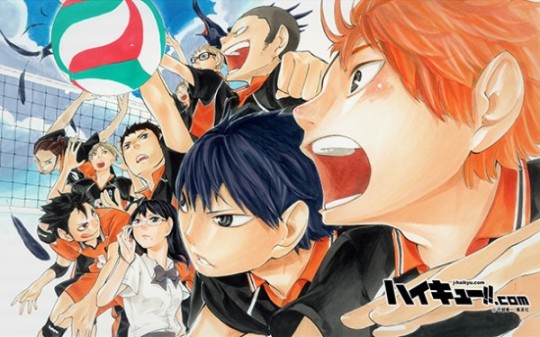
Here we are in the summer of 2020 and it’s usually San Diego Comic-Con time. And with it comes discussion of how manga is doing in 2020. There was a Manga Publishing Industry Roundtable discussion at Comic-Con with representatives from almost all of the U.S. manga publishers (which you can watch here) about what’s happening in the U.S. side of things. While manga sales have dropped due to the early months of the COVID-19 pandemic, they have rebounded back in some ways. A great thing about this is that it’s not just mainstream titles that are selling; it’s also series that are from other genres like slice-of-life and horror.
Which now leads into the title of this post because at the end of the discussion, publishers were asked about what they would like to see in the future. Erik Ko, chief of operations at UDON Comics, said something that really piqued my interest. He said that he wants to see if sports manga can truly break out in North America (i.e. reach levels of sales and popularity a la My Hero Academia, Demon Slayer, etc.). Erik mentioned how his daughter loves Haikyu!! on Crunchyroll and watched all 3 seasons multiple times (It’s also mentioned that Haikyu!! sold well during the pandemic for its U.S. publisher Viz Media).
While the manga has officially ended as of this writing, Haikyu!! will last for a while as the anime will have a 4th season and possibly more. However, while Haikyu!! is loved by a lot of anime/manga fans, it’s not exactly a series that has gotten EVERY shonen fan or manga reader talking. With the many sports manga licenses that manga publishers have gotten over the past few years, it doesn’t sound like there’s significant traction.
This does beg the question of what will it take for sports manga to really catch the eyes of manga readers here in the United States.
For starters, I’ll discuss a bit about the history of sports anime here in the United States. It’s been noted that a lot of sports anime do not tend to sell well over here. There was an Answerman article on Anime News Network answering “Why Do Sports Anime Bomb in North America?” that really goes into this. While it’s noted in the article that Yuri!! on Ice and Free! are indeed sports anime and have sold well, almost all discussion about those series revolves around the relationships between the male characters. Sports play second fiddle to the relationships compared to series like Haikyu!!, Slam Dunk, and Captain Tsubasa (where the sports aspect is still preached a lot).
Speaking of Captain Tsubasa, if you don’t know about this series, this is the one sports anime/manga that generated a lot of love overseas in countries that worship football/soccer. In the Manga: The Citi Exhibition book, there was an article on the promotion of Captain Tsubasa in Baghdad, Iraq by the Japan Self-Defense Force. The series was promoted via pictures on water distribution tanks in Iraq in the mid-2000s’ as a way to make Iraqi children smile. During the U.S. occupation of Iraq, Japan would later work with Iraqi media channels to show programming that would help encourage the country. One of these shows happened to be Captain Tsubasa, which was dubbed in Arabic. The series’ fandom took off from there and more places in the Middle East (like Saudi Arabia) even got in on the action using hacked satellites to watch.
I wonder if this is what Erik Ko wants to see - something like Captain Tsubasa that not only gets fans gushing about the story and characters, but also inspires kids to become professional athletes or at least become more physically active in their own lives.
A big problem that gets in the way of this happening in the U.S. is how sports culture is like over here. How do I explain this? I’ll use a quote from a 2016 article in the Milwaukee Independent about Anime Milwaukee.
“While the Anime Milwaukee convention does not collect statistical data about those who attend, walking around the convention provided empirical confirmation of how Anime speaks to multi-generational and multi-cultural people.
Anime itself will not solve the very real problems faced by disadvantaged residents in Milwaukee.
But unlike the adversarial escapism offered by sports teams and the nature of competitive games, the appeal of Anime is with its positive messages. Where as sports is an unrealistic role model for struggling youth, for the most part Anime offers socially beneficial and moral examples.”
Sports in the United States are very much “us versus them.” In Japan, sports focuses on healthy competition between players. At least, that’s what Japanese sports stories try to focus on. While healthy competition between players does happen over here, it either doesn’t get shown as much in U.S. sports media or that competition becomes toxic to the point it hurts innocent people. In the U.S., you’re supposed to win and get recognized in order to move ahead in your respective sport via whatever means necessary. A good example is college basketball over here and how competitive schools have been involved in recruiting scandals over the best high school players. Another example is the psychological trauma faced by the number of young female athletes who were sexually abused/harassed and forced to believe that it was all part of the process to get ahead in their respective sport. I want to note that sports programs in the U.S. are often heavily underfunded, which adds to the pressure that faces any youth going through sports programs.
There’s also this tendency to view athletes over here as all-knowing celebrity gods (i.e. athletes who say awful things with confidence on social media) or people that only know how to play their respective sport (ie. the “shut up and dribble” comment to outspoken basketball players on social issues). There’s no in-between where we get to see the complete humanity of the athlete.
This does tie into how sports fans and anime/manga fans may not get along. You usually learn more about the nuanced aspects of life from outside sports than within. Sports over here preach some questionable values that anime/manga fans sometimes don’t believe in. Add the fact that sports is shoved down Americans’ throats so much and you can see why not everyone over watches sports. I do want to note that there are U.S. pro athletes showcasing their love for anime. While this is nice to see, almost all the titles they grew up watching are mainstream shonen/shojo. I’m curious if athletes would watch series like Haikyu!!, Kuroko’s Basketball, Eyeshield 21, etc., but then I wonder if they would keep watching as they can only handle so much sports drama as it’s part of their everyday reality.
So what will it take for a sports manga to break through in a big way? Viz Media tried to promote Slam Dunk here using the NBA to promote literacy in 2008. I also found out that Tokyopop tried to do something with the NBA via its Cine-Manga initiative in the mid-2000s’ and it only lasted from 2004-2007. So to that extent, there probably has to some kind of manga that’s similar to the now-famous The Last Dance documentary, which chronicled Michael Jordan’s last championship run with the Chicago Bulls in the 1997-1998 NBA season.
Though honestly, it’s gonna take a mangaka who’s really interested in all aspects of American sports culture to come up with that kind of story. What might be better is that the story heavily criticizes the culture in a compelling and sometimes humorous way. I think that’s what will really get all U.S. manga fans and comic fans interested, especially those who are sick of commercialized sports exposure wherever they go. I do think over time as anime/manga continue to be accepted in the geek ecosystem, we can see this kind of story take off.
Until then, if you happen to be someone who likes both sports and anime/manga in a level-headed manner like me, you’re doing alright. It’s hard to occupy both spaces when you’re supposed to choose a side. Although I liked physical education during my school days, I can understand why anyone whose hobbies lie more towards the artistic and creative side disliked physical education possibly due to the structure in how it’s taught. I know sports anime lovers that dislike watching real sports in general and I get why.
Hearing Erik’s comments made me wonder about the beauty of sports manga. Now that I think hard about it, sports anime/manga are a intersection of both the “nerd” and “jock” in a way that helps everyone. To be honest, that intersection is what really bridges gaps that makes people better. It’s what truly completes a person. I’ll use this example - you can’t have mental health without physical health and vice versa. Some kind of exercise can help the mind while learning how your mind works can help you do better in physical activities that connect people together.
Maybe more importantly, what sports manga tends to preach is that winning shouldn’t be everything. Right now, everyone is encouraged to win at something just for a taste of meaningless status and we’re seeing how that mentality can ruin someone. Sports, with all of its benefits freed from corporate influence, are supposed to teach us (like all great manga stories do) that there’s no “us versus them,” there’s only “us” in the end.
And that kind of story deserves to hit a home run that rounds all the bases to reach a celebratory and meaningful win for the world.
#sports manga#manga industry#manga#mental health#psychology#sports culture#sports fandom#manga fandom
5 notes
·
View notes
Text
lord asriel’s quick analysis
Or why redemption isn’t always necessary.
Given that some people asked me to finish it and that I want to finish it, here’s my stroke over Lord Asriel’s arc. This is based on a post someone made it on reddit about the lack of redeeming traits on his part and this is my personal take on Asriel, so ok, here we go:
Let me get this out of the way: the thing about Lord Asriel is that he is not a redeemable character; that is not his purpose nor his story. He never seeks redemption, nor he sees his actions as a product of villainy or evil; in fact, Asriel believes he is quite righteous and he is willing to do whatever the fuck it takes to achieve his goals.
We never get a direct understanding of his motives: he does say he fights for freedom, he states his disgust with the Magisterium and the Kingdom of Heaven, and those who surround him believe in his cause and say, constantly, that his side is the right side, and that he fights for freedom and against the tyranny of the Church.
What is contantly overlooked is the fact Lord Asriel doesn’t require a redemption, this isn’t some sort of requirement a character needs every time they screw up. This, well, aversion to Asriel and the need to have him either punished or redeemed is solely based on the fact he killed Roger in cold blood, sort of, to wage his war for freedom. Was that fucked up? Absolutely! Does this means he requires redemption over that? No, and Philip Pullman himself explains why when Mary Malone says:
“I stopped believing there was a power of good and a power of evil that were outside us. And I came to believe that good and evil are names for what people do, not for what they are.” (The Amber Spyglass)
This has a lot to do with the recurring themes of the books, about morals, ethics and the poor use of free will by some, and it personifies almost every character in the books, from Lyra to Iorek. Everyone has committed some sort of bad deed at some point, but that does not label them as evil, and the same rules apply to Asriel. This is a man who’s crossed the very limits of the multiverse to achieve his goals, by being good in looking after the destruction of the Kingdom, and by being bad while killing Roger (plus being a bad father, a bad uncle, a bad lover, but let us remain philosophical for now).
Asriel is relentless, ruthless and sometimes, even cruel, to Lyra, to Marisa, to anyone really. At Jordan, he walks in, puts the fear of God (unironically lol) into almost everyone, including Lyra and the Master, he takes control of the enviroment and sets on to do what he went to Jordan for: to get money for his plot, so he can tear the sky apart and defy the Kingdom of Heaven. Lyra fears him (righteously) and admires his fierceness, she respects strength and brute force, it is the reason why she is so drawn to violent figures or rude characters, being herself quite rude and arrogant because she mirrors her uncle/dad.
He is considered to be a passionate man by almost everyone, and he causes a great impression in everyone he meets, including the reader. He was written as a likable character at first, made from scratch to fit in the role of the aloof, sometimes austere but caring uncle, or the traveler who serves as the inspiration for the hero (Bilbo Baggins, for quite the literal example, or Professor Kirke in Narnia). Sir Philip describes him, in Northern Lights:
“Then Lord Asriel stood up and turned away from the fire. She saw him fully, and marveled at the contrast he made with the plump Butler, the stooped and languid Scholars. Lord Asriel was a tall man with powerful shoulders, a fierce dark face, and eyes that seemed to flash and glitter with savage laughter. It was a face to be dominated by, or to fight: never a face to patronize or pity. All his movements were large and perfectly balanced, like those of a wild animal, and when he appeared in a room like this, he seemed a wild animal held in a cage too small for it. At the moment his expression was distant and preoccupied.” (page 13, Knopf edition).
He is, at first, compared to other men in Lyra’s life (the scholars, mostly) only to be extravangantly praised for being nothing like those men. Stelmaria, quiet and reserved, beautiful and pacifying, is the ultimate contrast for Asriel; together, they are one, and he is an aristocrat with wild temper, and she is a snow leopard, a predator, but beautiful and wise. These are the representation of Satan, as in Paradise Lost: forsaken and forgotten by history for fighting the Authority, Asriel and Stelmaria are the embodiment of disobedience and they are bound to rebel again because that is their nature. All that’s left to them is a reason and the Magisterium, oh boy, they’ve given them plenty.
Now, think about a man who’s had everything, then this rising power that was the Magisterium, comes and takes everything from him, from his money to his daughter over something, not trivial, but certainly something that didn’t require such harsh method of punishment; considering a lot of his wealth was confiscated and assuming he had to pay a lot of fees and taxes because of the Court Trial, he was very much not the man he was before Mrs. Coulter’s affair with him. He obeys the rules and stays away from Lyra, only to discover her mother is with the Church and that they intend to harm Lyra, even after he played nice. His friends in Oakley Street are trying to protect Lyra, but against the Magisterium, after witnessing how powerful they are, how far gone they are willing to go, things aren’t looking very bright for Asriel. He even says, in Northern Lights:
“They’re stronger than anyone, Asriel! You don’t know-”
“I don’t know? I? No one in the world knows better than I how strong the Church is! But it isn’t strong enough for this. The Dust will change everything, anyway. There’s no stopping it now.” (page 394, Knopf edition).
The Asriel we meet in La Belle Sauvage is younger and a man who’s just been massacred by the Church, as he reminds us of in Northern Lights; he is wounded after all that has happened, almost in a tender way, as if he had been softened by it. But he still is himself; proud, arrogant and scholarly, he risks Lyra’s safety and his own to indulge himself and be with her for a while, to spite the Magisterium and its distasteful influence. Under the moonlight, he loves her so immensely, in such a raw and fiery way, that for a moment Malcolm even thinks Asriel might leave with her, and so did I.
Everything Asriel does, everything that leads to his war in the name of the Republic of Heaven, has to do with Lyra’s birth and how he lost everything because of the injustice the Magisterium imposed on the world; how he had an affair with a woman he loved and how she could easily have gotten a divorce to prevent all of that; how they took his fortune and prestige because he was defiant. The murders, the oppression, his career as a scholar, his life as a whole, and then after the affair, his daughter’s, all was threatened by the Magisterium. It’s hard to say when he decided to fuck up the sky, but I like to think by the time he left Lyra at Jordan, he was already working on his revenge, because when he lost everything, that was his turning point. He doesn’t do any of this because he is a caring, loving person; he does out of hatred and indignation, two powerful tools that fuel his existence for the next twelve years, perhaps even before then, in small dosages.
There’s constant evidence of his hatred for the Church and their dogmas, especially on chapter 21 in Northern Lights, when he monologues to Lyra about Dust and how the Church allowed such things as Bolvangar to happen, implying that as many others, including scholars, he knew about what was happening. There could be a number of reasons as to why he didn’t interfer, and the most obvious one is that he was in prison, so there wasn’t much he could in his position. A second, deeper reason, is Mrs. Coulter’s involvement with Bolvangar, and by involvement I mean leadership, basically. He was fully aware she was the one responsible for Bolvangar, even enlightening us:
“That’s why they had to hide away in the far North, in darkness and obscurity. And why the Church was glad to have someone like your mother in charge, Who could doubt someone so charming, so well-connected, so sweet and reasonable?” (page 374/375, Knopf edition).
He speaks of her work with contempt and distaste, but also in a tone as someone who once fell for her masquerade before fully understanding who she was and her ultimate goal. Being his former lover, he sees the fact she works with the very Church who ruined him because of her, as disgusting despite their weird relationship dynamic, (which I could write a whole essay on but I’m not, because I already did it in college and that essay took me to a very dark place lol) and he despises her relation to the Church far more than he despises the nature of her work. And, as we see in the Amber Spyglass, despite inviting her to come with him, he is not eager to be in her company because he simply doesn’t trust himself when it comes to her and neither does anyone who knows both of them.
But the main reason he didn’t interfere, it’s because Bolvangar’s action, however crude and in favour of his enemies, was something he could take advantage of and their cruelty simply didn’t concern his own work, even if it was a discovery of his own that allowed such a thing. While they were doing something awful, they were too busy to notice his domination over his own house arrest or his plans in general, giving him the time and space he needed to finish his work.
Cruel and straightforward, Asriel is too practical and indecent to say he cared about the children: he hated what they were doing because the Church was tied to it; La Belle Sauvage!Asriel might have interfered and cared about it (he saved gyptian children from a flood, restored Malcolm’s boat, was gentle and wise in a rough way), but Northern Lights!Asriel was simply far too blindsided by his wrath against the Authority and the Church to give a damn. The only moment we see him hesitate is when he sees Lyra in the North, and for a moment he is taken by the shock of thinking he might have to sacrifice Lyra to kill God and destroy the Church, who was trying to, you know, kill Lyra. An ironic and cruel position to put him in, and he would’ve killed her, make no mistake; he keeps away from her because he simply knows he would’ve sacrificed her, or anyone else, including himself, to destroy God and the Magisterium.
Understanding this wild, carefree and inconsequential man is a crude task. The thing is, redemption is an overused trope and not everyone that does something bad needs it (or wants it for the matter), Asriel being the person who least requires it, because:
He is not a villain. I have seen this a lot and it honestly confuses me. Asriel, if anything, plays the part of the antihero, and even then he does so very loosely. We are constantly reassured by him and by basically every third party in the book (Ruta Skadi and her infatuation, John Parry and his wise comprehension, Baruch and Balthamos and their first-hand experience of the Kingdom’s brutality, amongst others) that Asriel is the “hero” of the war, that he is righteous and the one with the right views. He is not your conventional saviour, in fact, he is human and flawed, self-centered and ambitious, but charismatic and knowledgeable; that blur our senses and the lines and we’re stuck thinking he is either a hero or a villain when Asriel is, in fact, neither.
His ultimate goal is clear, albeit readable only between the lines sometimes. He is a liar, arrogant and wrathful, but once we get to the Subtle Knife, his goal is more clear, at least from Thorold and John Parry’s points of view (Ruta Skadi too, but she is far too unreliable for being too infatuated with Asriel): he wants to kill God and take down the Kingdom of Heaven. He says it’s for freedom and blah-blah-blah, and although I believe he seeks that outcome in the end, the reason he is doing this is much more self-serving and closer to revenge rather than doing what is right. He is a spiteful man, whom has been robbed of his wealth and his life by a religious institution who serves God and does anything in the name of God. Asriel wants to take them down because it satiates his need for vengeance, alongside his scholarly nature, by being a pioneer and an explorer of multiple worlds. It’s an ego booster, something to pat yourself on the back for.
He is unapologetic. He never apologises, or seems regretful over his actions. He isn’t apathetic, but he clearly does not resent his own choices. Killing Roger was a tough decision, but one he was intent on making because it was what he needed to do to achieve his purpose (hence his hesitation towards Lyra; he would’ve killed her if Roger wasn’t there). That was by far the most beautiful and sensible death ever written by Pullman: he doesn’t extend it or makes it purposefully dramatic and that’s because Roger’s death was merely a switch for everything else: Lyra and Asriel’s journey. Sir Philip makes us believe that Lyra’s ultimate goal is to stop her warmongering father, then he dismantles Asriel’s portrayal as the endgame bad guy for things of higher nature and Lyra simply stop blaming him, instead blaming herself, and everything she does from them on, is to spite Asriel by always staying away from him and his Republic.
These three aspects of Lord Asriel’s character core are relevant because they exempt him of a redemption arc. He doesn’t need to be redeemed, he asks for no forgiveness and he knew, from the start, where things were going. Perhaps not on Lyra’s account, but the overall outcome of his war. He never backs down, nor hesitates and Ogunwe claims:
“We’re not going to invade the Kingdom,” he said, “but if the Kingdom invades us, they had better be ready for war, because we are prepared.” (page 210, The Amber Spyglass, Knopf edition).
Despite the Republic’s claims of being builders, not conquerors, Asriel was the commander of a massive force and he was, fully aware, that the Kingdom would not leave them be to mind their business. They wanted that war, he wanted that war, and everything he did was because of it. That is why he only is granted peace, in a sense, in death as they plunge down into the abyss; it was a price worth paying for wrecking Heaven. He never truly dies, but instead is forged into oblivion.
A villain can be redeemed, and so can a purposeless character, but Asriel is neither of these things. He has a clear purpose, and he has done good and bad things in his life, he never apologises for what he’s done and he doesn’t intend to. He mimics great rebels of epic stories, and he embodies all that is truthful and essential to human nature: knowledge, passion, rebellious mind, the apex of free will and the wrath against those who do us wrong. He is neither a saint, nor sinner: he is both, as are every person in those books, and he embraces fully his nature. Once again, as Mary said: he’s done bad things, but he isn’t evil himself. No one truly is.

And this is it, sorry for the essay, I have thing for academic men in linen shirts who want to tear Heaven apart lol @laciefuyu this is for you hahah
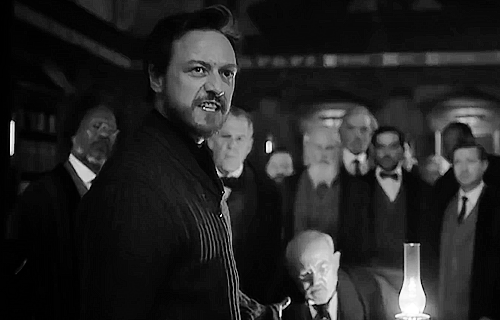
#his dark materials#lord asriel#hdm#long post#hdm meta#this is like me scratching the surface of my previous thesis lmao#but this will have to do#do i have a lot to say on asriel? yes#i love him so much omfg#sometimes i need to remind myself he isnt real and that hurts#pls authority give me a raging academic as a bf/gf#oh its ok im the raging academic i know#lord asriel: a me: you can fight my freedom anyday hun#hdm spoilers#meta by effie
170 notes
·
View notes
Text
Charmed 2x12 Review SPOILERS!!!!!!
Okay let's do this. Sorry I skipped one but times are hectic. For entertainment I give it an 8/10. Same format. Dislikes, likes and highlights
Dislikes
1. Macy Kneeling to Abby.
Let's just get this one out the way. I can see where they might have been going with this.
They maybe are trying to move away from the ambiguous route with abby (trying to make her sympathetic with her whole patriarchy thing and her dead mom) I mean she is progressively becoming more predatory with Harry so with that in mind, this was possibly one of the "abby is really a bad person not a feminist as she is only out for her own gain and not the empowerment of all women". And I can get that maybe they were also trying to show "look Macy is willing to do the most degrading thing possible just for the chance at rebuilding that power of three/charmed bond with her sisters for the protection of the magical community".
But listen.....
We all know Abigael isnt a star feminist. We already know (although we dont exactly know) that she has some sort of plan up her sleeve to be weary of.
There has been too much attempted ambiguity and the main characters letting her get away with terrible things that the message isnt coming across.
Plus Maybe yes showing Macy being willing to do something that really probably hurt all of us (epecially those of us who are minorities) to watch, may have been to drive home the differences between her and Macy and play up Macy's love for her sisters
But like we know Macy and Abby arent similar (as much as you writers tried to play that up at first). And you know just adding more sister bonding moment and just the fact that Macy was willing to go to abby after all the previous stuff was enough to show she was desperate? Maybe just add more sister bonding moments so we can see how dedicated they are to each other?
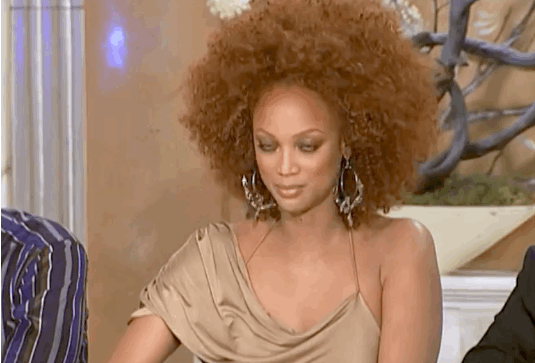
Maybe? Just saying.
If the writers are finally going to commit to Abby being a full on villian then I guess the seen was worth cementing that she is horrible (sort of).
Here's my question though as I consider whether the scene was worth it. Who is this show for and what is it trying to show? I mean if it is for minorities and women then i can see how showing these historical and current issues (conflict of power and consideration among women where race is concerned) then I guess showing it and having that controversy makes sense. But like we live it.
As minorities we already know. I know I struggle between wanting my experience shown and also wanting to watch something where for once the minority characters arent subjected to that experience. Charmed did better at addressing controversy and women's issues in season 1. I dont care if it was "obvious" or "heavy handed" because when it is not you basically get the kneeling scene where you dont know what the point was, if it was necessary, and are left feeling hurt or bitter about it.
2. Hacy Kiss.
Listen Brenda/on, this is on my like and dislike list. I will mention what I dislike about it.
The first thing is that it was a fantasy. I mean yes I like that we get full on confirmation that Macy has romantic feelings for Harry and not just considering that she might have them, but I honestly hate the fact that they would tease us like that. Especially when Macy is at a low moment. Which I will get into.
They are kinda ruining Macy for me. Listen, at this point they havent given us enough insight into Macys feelings or thoughts to understand why she isnt pursuing Harry. We can speculate and infer based on previous seasons and some of what the writers or showrunners say on twitter, but this season itself hasnt done much in showing Macy's thought process and so it falls flat. It isnt her reluctance to let people in or not wanting to get involved with someone after Galvin since she does pursue Julian and gets serious relatively quickly. She, at least now we it is confirmed, has those feelings for Harry, but is still choosing to be with someone else inspite of those feelings. I hate that. Harry is obviously tempted by abby and is being naive with her, but he isnt pursuing her and has blocked her advances (except the kiss) so far which may change who knows, but the point is if Macy was just casually dating and enjoying Julian's company I would be like okay, still hate that she would lead someone on when she has feeling for someone else, but if its casual there is less of a chance of the other person being hurt.
I cant get behind Julian x Macy, not because of Julian (who so far is perfect and probably going to be a villian or some how connected to the villians because it is a common trope) but because of Macy. Julian x Macy isnt Healthy because Macy knows she has feelings for someone else. She is using him. That isnt to say she doesnt genuinely like or care about him, but at the end of the day she is using him. Which is crappy because Julian so far seems like a great guy and doesnt deserve being the "distraction". I mentioned this all the time but my least favorite love triangles are the ones where one person is using the other.
Healthy would be Macy and Julian being friends while she works through her feelings and then decides who she wants to be with. Not being with someone while having feelings for someone else.
Macy was shown in season 1 to be rational and could be rational to the point of compartmentalizing and coming off as cold. So maybe that is where they are drawing from, but again little effort has been made on the part of the writers to show what's going on in her brain other than that fantasy kiss. And again I am still like....okay so what does that mean in the long run you butts!!!
3. Helen's suicude
I am so iffy about how shows portray people completing suicide. Like on one hand I get that them showing her exercising free will, but suicide portrayed as a positive rather than a tragedy is just....ugh for me. I still am not sure how I feel overall about it.
Lore wise I hate that they use it to explain why Harry and jimmy couldnt kill each other, because in an interview rupert claimed Harry was immortal now because of the elder thing and the show said it in that first episode. So like are both true? So if harry tries to stab himself like Helen will he just end up back in the coffin and alive since she is immortal?
I mean we are 12 episodes in and have about 10 to go so we really should be working towards a cohesive lore and storyline not adding confusing or not well explained layers. The world building they did in the first half was a lot better which makes me wonder what they heck is going on in the writing room.
Likes
1. Parkerita
Let me explain. While I fancy Jordan x Maggie together. I'd prefer that be a slow burn and steady friendship first. Parker seems to be Maggie's first love. It makes sense that she is still grieving and holding on. While I kind of wanted to be done with Parkerita in fairness to all the season 1 romances that where tossed out, I like the nod to Phole. I felt the OG Phole relationship was not healthy, but I liked the tradgedy of it. I think if new Charmed wants to wrestle with that and do it better (although my faith in the writers is low right now) then I wouldnt be against it. I love a good tradgedy and I sat through Phole so I'll sit through this one.
2.Hacy kiss
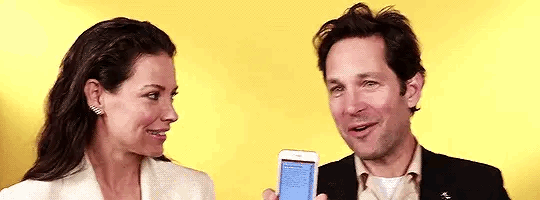
I love that the writers finally did something to show us what is going on in Macys brain. I need more (not necessarily Harry fantasies but I wont complain if we get more of those). I do hope a real Hacy kiss is a bit different because one one hand the fact Macy wanted to kiss harry when she was feeling down says something to me about how she feels about him and that she still trusts him (but it could, If I wanted to be cynical, just be more evidence that Macy skews towards using people when she is repressing or feeling down although she didnt actually kiss him, if she had I think I would have not liked it in that particular moment given it would have felt more like using him that expressing feelings)
Highlights
1. Abby really thinks no means maybe 😒 . . .
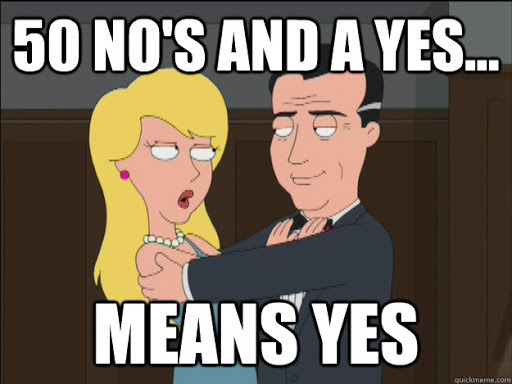
2. Mel is a lesbian magnet and I'd be fine with her just casually dating while all this other crap is going on as long as she is happy
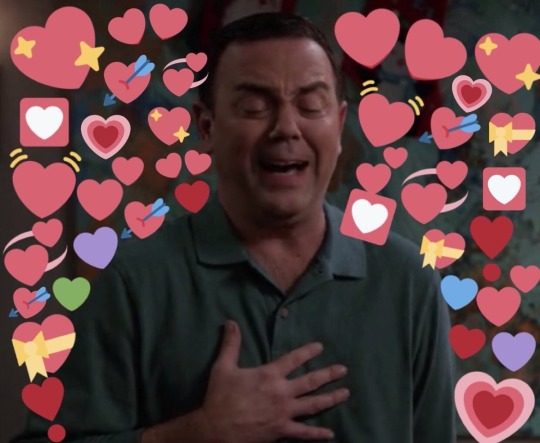
2. Helen
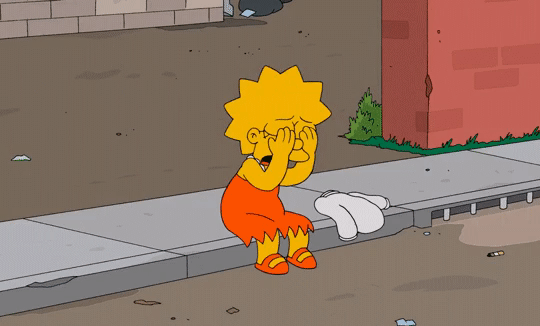
3. These horror movie vibes though!!

#the cw charmed#charmed reboot#charmed cw#charmed#charmed 2018#charmed 2018 spoilers#charmed spoilers#hacy#macy x harry#harry x macy#harry greenwood#macy vaughn#mel vera#maggie vera
19 notes
·
View notes
Note
Have you ever had to deal with a superior trying to sabotage you because they were threatened by your potential/ability? If so, how did you deal with it?
Related answer:
What other qualities do you look for in a job before you accept? What should we be aware of before we accept an offer?
The classic case of the bad boss is the number one cause of misery in the workplace.
To answer the question, no, I’ve had bad managers with poor leadership and poor communication skills but not someone who tried to outright to sink my career. The relationship between you and your direct manager is the most important relationship to manage because this person has the power to make work life tolerable or miserable. Managers control the delegation of tasks/projects plus performance reviews which influence promotions and raises. They can really screw with your schedule, your money, your work-life balance, your career trajectory, and your mental health. With that said, there are some things to try.
First, here’s what generally won’t work:
Talking shit about your boss to your colleagues in order to stage a “mutiny.” Your colleagues won’t fight for you and you’ll probably make the situation worse.
Fighting your boss for “dominance.” An employee trying to fight their boss in their boss’ team while being employed by their boss is like a student trying to fight a professor in the professor’s class while taking the professor’s class. You can’t win and you’ll probably get fired.
Slacking off to spite your company/boss. You’ll ruin your work reputation, inflict more work on your team (and piss them off in the process), and then you’ll definitely get fired.
Reporting your boss to their boss. If those two are friends, that won’t work and it’ll only result in gaining a second enemy that has more power than your boss.
Considerations:
Evaluate the situation. Are you sure your manager is threatened by your potential/ability or is there something wrong with your behavior? As a rule of thumb, high-performing employees are like superstar athletes on a sports team and managers tend to love them because they help the team win. Why would a coach try to sabotage their star athlete? That’s like shooting Michael Jordan or Cristiano Ronaldo before the championship game. Ask yourself:
Do you have a history of problems with authority figures? Think outside of work to teachers, professors, parents, etc.
When you disagree with an authority figure, how do you express yourself? Are you aggressive and combative or calm and collaborative?
If a decision is made that you disagree with, do you commit to that decision, be a team player, and help the team succeed? Or do you resist, try to sabotage the effort, and throw a fit because your way wasn’t chosen?
If the answers are yes, the issue may be you. Do some self-reflection or the problem will repeat itself in the next job. If structure and authority are persistent issues– and they were for me when I was younger– get skills and education in fields where you can be your own boss.
Remember that no one likes being told what to do, but college students don’t graduate and instantly become CEOs who call the shots. People need to work their way up the ladder until they reach a position where they have power and control to make important decisions. This is why career acceleration was one of my biggest priorities when I was younger– I didn’t want to stay very long in positions where other people told me what to do, I wanted to become a boss as soon as possible. Even with my accelerated career trajectory, there were years when I had to work under leaders that I disagreed with and that I felt were highly incompetent. I found a way to get along with them and they eventually became my advocates.
Repair the relationship. Are there opportunities to fix the relationship? As a rule of thumb, managers like to look good, and they like even more team members and colleagues who can help them look good. Are there any projects or goals that you can take on to build goodwill with your manager? Ask yourself:
What are this person’s highest priorities and how do they define success? Find ways to help and bring value. If it’s sell more X, then sell more X. If it’s write more reports, then write more reports.
What are their major pain points? If it’s a certain task, volunteer to take it off their plate. If it’s a meeting, ask if you can lead it. If it’s a client or account, strategize how to solve problems.
This reframes the relationship from combative to collaborative. If you can make someone’s life easier, they’re easier to win over. If you help your superior so well that they get promoted, there may be an opportunity for you to also get promoted to fill their previous position.
Transfer laterally. Explore opportunities in another teams in the organization. Network with other leaders by helping with side projects and initiatives. This builds relationships and serves as a mini-interview to expedite the process.
Quit. If someone was trying to explicitly sabotage my career, I’d quit and move on. Full stop. Period. No job is worth suffering long term for and with my education and extensive career experience, I’d get another top offer tomorrow. There’s no gold star award for enduring and staying in a toxic environment, don’t waste time being miserable when you can be happy. Move on.
27 notes
·
View notes
Text
Chapter 32~ Family Feud (Part 2)
Nobody wins when the family feuds
But my stash can't fit into Steve Harvey's suit
I'm clear why I'm here, how about you?
Ain't no such thing as an ugly billionaire, I'm cute
Mmmmm
Pretty much
If anybody gettin' handsome checks, it should be us
Fuck rap, crack cocaine
Nah, we did that, black-owned things
Hundred percent, black-owned champagne
And we merrily merrily eatin' off these streams
Y'all still drinkin' Perrier-Jouët, huh
But we ain't get through to you yet, uh
What's better than one billionaire? Two (two)
'Specially if they're from the same hue as you
Y'all stop me when I stop tellin' the truth
Chapter 32- Family Feud (Part 2)

Olivia
I honestly didn’t want to be here. I wish I wasn’t in this position because I wasn’t in the position to be asking for favors. But here I am. I literally have been standing outside his office, trying to get myself to knock on the door, but I never could.
With me wanting to adopt Aiden and Jeremiah wanting full custody, I couldn’t be our lawyer. It was a conflict of interest so I had to recuse myself from the dealings, but I needed to ask the best attorney and partner in our firm that dealt with situations like this all the time.
He just so happens to be my ex-boyfriend, Jordan.
I tend to stay away from him, because I felt extremely bad by hurting him. Especially with my injuries causing me to miscarry our baby, and he had plans to propose, but I couldn’t deal with his pain, as well as mine, and my feelings for Jeremiah coming back. It was horrible. We never really talked about it, but we had a mutual understanding to not talk about it.
“Olivia, if you’re not going to come in, please go to your office.” He said, from sitting at his desk
I sighed and I walked in the room, closing the door because people don’t need to know my business.
I sat in the chair across from his desk, he just continued writing and I sat there and stared at him. I truly didn’t know how to have this conversation, but I needed it for my family and for Jeremiah.
“Are you going to talk, or are you just going to stare at me.” He spoke while looking up.
I sighed, “I know I’m not in any position, but I need a favor.”
He chuckled, “You’re right, you’re not in any position.”
“Jordan, I-“
He put his hand up, stopping me from talking and asked: “What is it?”
“I want to adopt Jeremiah’s son Aiden and we want to file for full custody, taking away Avery’s rights.”
“You want me to help you adopt your ex-husband’s son, the son that caused your divorce in the first place?”
I nodded, biting my lip. I knew exactly where this was about to go.
He cleared his throat and sat up, putting his hands on the desk, “You do know, that because you are divorced, it will be extremely hard for you to adopt him. You can’t just be living in the same house.”
I couldn’t look at him, but I said “That won’t be a problem.”
“Since when?”
“Since last weekend.”
He shook his head, “You remarried Jeremiah.”
I nodded my head, “It was inevitable. We love each other and I just, I missed my marriage. Having what happened to me, put this in perspective, I’m sorry. I’m also sorry that we never really had the chance to grieve… I just couldn’t live in that”
He looked at me and sighed, “No need to explain, I get it.”
“You’re not mad?” I honestly wanted to know because yes, I love Jeremiah, but I also loved Jordan at one point and I never want to hurt him.
“I mean, I have no reason to be mad, you were completely up front with me when breaking up with me. I was pretty upset that you dismissed our baby like it was nothing, because I also was in pain, just like you.”
“I never meant to cause anymore pain, but I’ve been through miscarriages and it’s not something I am willing to talk about freely. Trust me Jordan, I had no plans in remarrying Jeremiah, or even getting back with him, it just happened that way.”
He nodded, but didn’t really speak anymore. So,we kind of sat quietly, I didn’t want to overstep but I needed an answer because J and I want to get this done, as soon as we can.
“Will working with us, cause any problems?” I asked.
He shook his head, “No, I’m actually back with my baby mother.”
That was a surprise to me, it’s not that they hated each other, but She kept his daughter away from him, due to personal things. So, they always kind of fought.
“Are you happy?” I asked him
“Are you?”
I smiled, “I am, we basically reinvented our relationship and we have grown from our past, He loves me and I love him. I am happy.”
“I am happy that you’re happy. I am as well, I get to see my daughter every night and I am getting closer to her mother, we are moving forward.”
“And that’s the only thing that matters right.” I smiled to him,
“I’ll help, but Jeremiah and I need to sit down and talk before we can proceed.”
I nodded, “That’s fine, I can make that happen.”
I got up to shake his hand, and he rolled his eyes, got up from his desk and hugged me.
“Does Rack know y’all remarried?” He said with a little sarcasm behind his voice,
I stood back from the hug, and I looked at him,
“God no, none of the family knows yet. They won’t know for a long time.”

Kamryn
Picking up the girls from X’s place, low-key has become my favorite part of co-parenting, maybe it’s selfish, but I love fucking him.
He’s the only person I have been with ever, and I’m focused on raising my girls, not dating. But a woman has needs.
Walking up and knocking on the door, X came and opened the door.
“You’re early, today.”
I looked at him like he was slow, he knows I come early… so that I can cum early.
“X, stop playing you know that I always come early.”
I was slightly confused, but I know for a fact he knows what’s going on. Instantly, he slaps his forehead.
“I forgot to tell you, I can’t today. I have business to deal with. So it’s great that you came early because I need to go. GIRLS! MOMMY IS HERE!”
I just looked at him in complete disbelief, he knows that I am here to have sex, get the girls and leave. So for him to flip the script, I was pissed.
The girls ran downstairs with their things and instantly hugged me.
“What’s the matter mommy?” Mari said.
“Nothing baby, cmon, let’s go. Daddy has got work today.” I said spitefully, just so he knew I was pissed.
“I’m sorry Kam. I just-“
I shook my head, “I don’t care, Do you X” and walked to the car putting the girls in, and pulling off.
---
We were at the ice cream shop, because Mari and Mani bugged the hell out of me, just so that they can get ice cream, plus I was in a bad mood. I wasn’t really paying attention to the girls and their conversation, I was scrolling on my phone, when Mari said something that caught my attention.
“How do you feel about Daddy’s Girlfriend Mani?” She asked licking her ice cream.
“New Girlfriend?” I spoke causing them to look up at me.
“Yeah, She’s pretty nice I guess. She cooked us dinner the other night.” Mani said
“She cooked you dinner?” I furrowed my eyebrows, I was starting to get pissed. How in the fuck could this nigga not tell me he’s dating someone.
Do I have claim on him, absolutely not, we’re separated and getting divorced, but we agreed that we would talk before introducing the girls to a significant other. He’s breaking the rules of Co-parenting, and that’s just rude.
“Yeah, it was okay, but it wasn’t good like yours mommy.” Then both girls looked at me and smiled, I love them but I know those smiles, and they know exactly what they’re doing.
I didn’t raise idiots.
“What do y’all know.” I said sitting back in my chair crossing my arms.
They looked at each other, but didn’t say anything.
“Fine, I guess this is y’all last ice cream, for a long time.” I threatened.
“Okay, it’s Katie’s little sister Callie.”
I looked at them shocked, “Does she spend the night at Daddy’s house?”
“We aren’t supposed to tell you. Daddy is gonna get mad that you know he’s dating her.” Kamari said
I nodded my head, Oh Xavier…. How little do you know me.
I chuckled, I smiled, “I’m not mad, and I won’t tell daddy that I know, we’re breaking up. He can date whomever he’d like.”
The girls took my calmness as a good thing, and went back to talking about whatever they liked.
I picked up my phone going on Instagram, I went to my blocked section and clicked on the only name in my list. Callie_California
Looking at her page, here she was posting pictures of her and Xavier… from now and even when we were married.
I wasn’t mad, I was beyond FURIOUS
But I wasn’t about to let him or her know, that I knew about their relationship or the fact that I was this angry.
But I do know, that I am about to Ruin this little bitches life.

Katie
Along with me being in jail, I have to go to required counseling. Which, I think, in itself, if very interesting and peculiar.
I had to come to terms that I am a murderer, because I wanted to be with Dominic. I chose to bring the gun in the court house, and I chose to shoot that judge, the guard, Olivia, Mason and the one that hurt the most Dominic.
Because of my terrible actions, I will never be able to raise my daughter, another woman is. I think, that’s what is killing me.
I have yet to see Andrea, and Dominic sends my mom pictures, and she sends them to me. But I am literally going crazy since I gave birth about 6 months ago. She seems like the biggest and happiest baby and she doesn’t even know who I am.
Most days, I consider killing myself, because is it worth it? I don’t get to live and be with the love of my life. I don’t get to raise my daughter, my son is dead. I just don’t see the brightness in me living anymore.
Standing in line I was waiting for the phones to call my mother, or Dominic, I didn’t really know which way I was going to go.
I wonder sometimes in here, how my life would be if Giselle never came back or even if the ruling would’ve went my way. If Giselle wouldn’t had came back, Dominic and I would’ve been married for about 6 months. Andrea’s birthday is Dominic and I’s wedding date, that’s why she’s so special, and DJ would’ve been going on 2 or so. We would’ve moved into the new house that he was having built for us, I would’ve been happy and in love, and now look at me. Miserable, alone and in jail.
Going to the phone, I knew exactly who to call. The person who never lets me down.
“Hello?” He answered and I smiled, hearing his thick italian accent
“Kaitlin Rossi.” I answered as the automated system told him the inmate that was calling, I was hoping he’d accepted the charges.
“Hello, Alexxandra.”
“Hi Papa, I miss you.”
“I miss you too Alexxandra. Your mother is not around for you to talk to.” He spoke
“I know papa, I called to talk to you.”
He sighed, “Alexxandra-“
I cut him off before he could say something else, “Daddy, please. Mom is colder than usual. The whole family has disowned me, I don’t have my daughter or my son, I’m not married, I’m in jail. Please just talk to me.”
He stayed quiet. I knew he was contemplating disobeying my mothers orders, but he knew as well as I did, she would see the call on the phone bill anyways.
“Daddy?”
“I’m here, Alex.”
I teared up at hearing my childhood nickname, “Where did I go wrong daddy?”
“You went wrong when you decided to marry a man still in love with his wife. and when you decided to have children with him.”
“Dad-“
“No Alexxandra, I should’ve had this talk when you first brought him home. You should’ve married the Carmicheal’s boy. Pure Italia. Like Me, like Baba and Bubbie. You and Alessandra like Macacas, Alessandra is a mistress and you’ve killed people.”
For Papa to call Dominic, a racial slur… that was low, and I knew he was about to do what the rest of my family did. Disown me.
“Papa!! You forget that Noah’s dad is black, and you raised Noah like your own. Mamma is even half black and you fell in love with her. You can not call DJ or Andrea or even their father that!” I defended them no matter the consequences
“NON MI INTERESSA! ALEXXANDRA! I need to go”
“Papa, per favore.” I begged
“Dont call unless your mother is home. I will not speak unless she is around.”
“Pa-“
Before I could even finish calling out his name, he hung up the phone. Angry at the last person i had in my corner leaving me, I slammed down the phone onto the receiver.
I kept slamming the phone, cutting my hand and snatching the phone out of the wall.
But I didn’t care.

Giselle
Here we were, on this “date” that Dominic forced me on. I was pretty quiet the entire time, but I knew that wasn’t going to last because I couldn’t stay mad at him for long. Especially when he was in my face, it was easier being mad when I didn’t live in the house and saw him everyday.
Living back in the house, has been quite an adventure. Mason was excited and happy. I literally had to drag Angel to the house. She kicked and screamed and wasn’t happy.
My daughter told me and Dominic “I hate you.” at least a million times in the first hour of us living at the house. She didn’t help with Andrea and she barely said anything to anyone except Mason. Do you know how exhausting it is to speak through a little boy who barely talks himself.
“Can you stop picking with your hair and talk to me?” He asked, making me come out of my thoughts.
I slowly let go of my hair and looked around the room, it was very romantic, but I wasn’t going to fall in the trap,. “What do you want talk about?” I said above a whisper.
He shrugged, “How awful Angel has been.”
I chuckled, “ She’s been through a lot, that’s the reason why she acts out.”
“Is that why you acted out with your father.”
I rolled my eyes and smirked a liitle, “You liked it. and I didn’t act out.” I picked up my wine and took a few sips of it.
“You did, and when you did, I would give you that good dick and you wouldn’t act out anymore.” He smirked taking a swig of whiskey, and his comment caused me to almost spit out my drink.
“Shut up.” I said laughing, which made him laugh
“I miss your laugh, it’s been a long time since I’ve heard it.” He spoke sadly
I shrugged, “I haven’t had much to laugh about since I was about 14.”
“Why cant we be like this Gi? Smiling, laughing enjoying life together.” He said reaching out for my hand, but I quickly took my hand off the table.
“Because.”
“Because what?”
“Because you had 2 babies with another woman, because you almost married a psycho bitch who almost murdered you, my cousin, and my son. Because I was kidnapped and left raising mason by myself. Because you had to raise Angel her entire life without me. and because, every single time I let myself love you again, something detrimental happens.” I said exasperated
I didn’t even know all of that was in me. I thought I was over the children with Katie, but I didn’t realize that I still held resentment towards a lot of things when it came to our relationship.
“Hell, Angel hasn’t been through what we have.” He said cynically
“Exactly. I don’t think it’s good for us to be together Dominic. Why cant you accept that?”
“Because I love you, and I’ve loved you through 2 kids with another woman and almost marrying her. Loving you through you being kidnapped, raising mason and me raising Angel. You view it as a negative, but I view it as the world pulling us apart, but no matter what, we find each other. I cant give that up, you’re the only person that it happens with. That should say something.”
I sighed and started playing with my hair again.
“Fine. Let’s talk about it all then Gi. I want to clear it all up, I’m serious.”
Before I could respond back, the waiter came back with our food, once he left, I said “Okay.”
----
Five and a half hours later, we talked about everything that went wrong in our relationship, but hearing his side of everything, put it all in a different perspective for me.
“I never want you to ever think that I ever stopped loving you, because I didn’t. I just, I thought you were dead, Angel needed a mother figure, I couldn’t be bitter anymore.” He mumbled.
I nodded, “I didn’t. I never did, but I just didnt expect to be replaced. Imagine if you were me and I said Mason needed a father figure, how would you feel?”
“Yeah, I’d be pretty pissed too.”
“If we do stay together, do you expect me to replace Katie and adopt Andrea?” I asked
It took him a while to answer and I knew he was trying to pick his words wisely.
“First of all, if we do stay together and you officially adopt her, I would want you to be okay with it and for it to be your idea. I never want to force you into something that you aren’t comfortable of doing. Secondly, I would never expect you to replace Katie for her. That’s her mother, but she’s a risk towards her. The agreement I have with Katie’s mother is that you’d help raise her and that she’ll go to see Katie when we see fit. and I know that even if we didn’t stay together that you’d probably treat her like your own anyways.”
I agreed, because it was true, I wouldn’t want her to feel separate from Angel or Mason, regardless of how she was brought in the world, she’s Dom’s child and Angel and Mason’s sister.
“I mean, at this point, I’m okay with helping raise her, but I’m a little apprehensive when it comes to adopting Andrea. I would like to see how things work out with us.”
He smiled, “So, you’re open to ‘seeing how things work out with us’”
“Yes D. I am open, but if this doesn’t work, I’m not trying again.”
He beamed once I said that, I just shook my head.
“You know, maybe you can help me come up with a name for Andrea, I dislike ‘Andrea’”
“What’s her whole name?”
“Andrea Dominique Rossi Cartier. I was thinking Andy or something? I don’t want to change her name, I want Katie to feel that she has a connection to her, but I don’t like it.”
“How about calling her, Dominique, like we call Mason, Mason. His first name is Dominic.” I suggested.
“Dominique? I like it.” He smiled
4 notes
·
View notes
Text
Wheel of Time liveblogging: The Gathering Storm ch 34
Everything from fireworks to Fourier transforms, because why the hell not. Oh and Mat is there. (Or is he?)
Chapter 34: Legends
Oh it’s Mat.
I have very little enthusiasm for Mat, especially this book’s Mat, but at the same time maybe it’s good to have a chapter that isn’t guaranteed to ruin me, just for a change of pace and a chance to catch my breath and regrow my limited supply of emotions.
Occasionally, the wind would blow, and a small sprinkle of dead pine needles would shake free from the boughs above
I see what you’re doing there, with your wind associated with death and release.
Mat’s clearly still a little shaken by Hinderstap, and is not particularly keen to go running into this next town. Can’t say I blame him.
This time he would plan and he would be ready. He nodded to himself in satisfaction.
Yeah, no, still not getting the cadence right here. It’s too…deliberately set up to be funny. Exaggerated. It’s like he’s being written as a caricature of himself.
Apparently it’s a woman who’s looking for him…I thought the pictures of him and Perrin were linked to Moridin’s directive to kill them – we’ve seen at least one attempt on each of them since then – but this sounds like someone who just wants to find him. Who, though? It doesn’t seem like it could be Tuon, and most of the other characters are tied up elsewhere, and none have recently mentioned trying to find Mat.
And it would probably be more efficient to just…read and find out than to try to list out all of the named female characters in the series thus far and cross-reference them against Mat’s story to figure out why they might be looking for him, wouldn’t it? I’ll leave the listing of ladies to Rand.
We’re getting fireworks as signal flares again, and I do have to applaud the ingenuity of the charactesr in this series. So far we’ve got fireworks used as: a distraction, entertainment, currency, battering ram, therapy, weapon, communication device. Have I missed anything?
Also, the red-for-danger, green-for-all-clear system brings another question to mind that maybe someone out there has an answer to: why do we continue to rely so heavily on red/green for important signalling distinctions (port/starboard, stop/go – things you really don’t want to mix up) when red-green is the most common spectrum of colourblindness?
I suppose the choice of colours predated any solid statistics on things like rates of colourblindness, and boats have the whole whistle system as well, and traffic lights have position as well as colour, but still.
Maybe it’s a chemistry thing? If red and green are the easiest colours to make in a fire or lamp or flare or light, it would make sense that those would have become the colours used for signalling when coloured lights were first used in such a way, and then it’s the kind of thing that would stick. So maybe lithium/strontium/barium/copper were more readily available, or happened to be used/discovered as colourants first?
And that was a tangent.
Meanwhile, Mat’s pulling a whole Argo here, creating false identities for the people he’s sending into the town. Okay, a reverse Argo, maybe, as that was exfiltration and this is infiltration but shhh. (Great movie, by the way, if you’ve not seen it – one of those ‘stranger than fiction’ true stories).
“Wait, Mat,” Mandevwin said, scratching his face near his eye patch. “I’m to be an apprentice gleeman? I’m not certain my voice is suited to fine signing. You’ve heard me, I warrant. And with only one eye, I doubt I’ll fare well at juggling.”
So I think by now we all know my thoughts on what ‘give up half the light of the world’ means, what with Mat being as Odin as it’s possible to be this side of actual Norse mythology…and yeah that doesn’t bode well for his juggling and knife-throwing skills, does it? Now I wonder if those skills were given to him intentionally not just as a fitting trait for a character of his archetype but to twist the knife a little in that sacrifice. Like Rand’s skill with the sword and then the loss of his hand.
(Also his skill at being a person and the eventual loss of his sanity, but we’ll just leave that one alone for the moment.)
“Aren’t I a little old to be an apprentice, though?”
“Nonsense,” Mat said. “You’re young at heart, and since you never married – the only woman you ever loved ran away with the tanner’s son – Thom’s arrival offered you an opportunity to start fresh.”
“But I don’t want to leave my great-aunt,” Mandevwin protested. “She’s cared for me since I was a child! It’s not honest of a man to abandon an elderly woman just because she gets a little confused.”
“There is no great-aunt,” Mat said with exasperation. “This is just a legend, a story to go with your false name.”
The thing is, if you take it completely out of context – as in, out of the Wheel of Time completely – there’s nothing particularly wrong with this exchange. It’s not the funniest thing I’ve ever read in my life, but it’s entertaining and a fun sort of ‘yes and’ game between characters. It builds a sense of their relationship, adds a little bit of depth to Mandevwin, presents Mat as creative and a little more fond of stories than he might admit while being a general…
But you have to completely dissociate it from the actual characters for it to work. It’s an alright scene, if it’s not about Matrim Cauthon in The Wheel of Time. If you read it as being from a different story entirely, with characters that just happen to have these names.
And that’s pretty much the problem with Mat. Other characters may see their lexicon shift a bit, or their tendency to externalise their thoughts a little more, but Mat’s been replaced with another character entirely.
I mean, so has Rand, but that’s his own damn fault.
“Too late,” Mat said, rifling through a stack on his desk, searching out a cluster of five pages covered in scrawled handwriting. “You can’t change now. I spent half the night working on your story. It’s the best out of the lot.”
I could almost give the rest a pass, because Mat coming up with false identities that make a fine story but will probably end up falling apart is not too far out of character, even if the conversation felt nothing like him – it’s not unlike what he did with himself, Egeanin, Tuon, and the others when they ran away with Luca’s show, after all – but Mat spending half a night writing up stories for each of them? I can’t make that fit.
“Are you sure we’re not taking this a little too far, lad?” Thom asked.
I think it’s meant to be a little out of character, as a way of showing how on edge he is. The fact that Thom comments on it serves as a narrative cue that this is intentionally off. But it’s too far and not quite in the right direction, so instead of helping us understand where Mat’s head is right now, it’s just…weird.
“I’m tired of walking into traps unprepared. I plan to take command of my own destiny, stop running from problem to problem. It’s time to be in charge.”
And the fact that Mat is so off in this book makes it hard for me to say anything about his actual story or character, because I don’t completely…trust any of it enough. So on the one hand I want to unpack this line, because there’s a lot there in terms of Mat’s own character arc, and his struggle between denial and acceptance of his role, and between luck and improvisation vs planning and strategy. But on the other hand, it’s hard to find any real motivation to do that when I feel like this isn’t really Mat. If that makes sense.
So actually, I’m going to do something a little out of character myself, here. I’m going to read the rest of this scene before commenting further, just to see if I can get a better sense of what’s going on from the general shape of it than from following it line-by-line.
Okay. Mat talks Talmanes through his own constructed backstory, then goes and inspects the camp and thinks about the Band and their current situation and also crossbows, and now he’s visiting Aludra so I’ll stop here for a moment before we get into that.
The bit with the crossbows comes closer to feeling like Mat again. The rest…still feels like it belongs in another book entirely. Also, weird how Mat knows two guys named Talmanes, right?
There are two main issues at play here, as far as I can figure it. The first is the issue of perception and distortion, which, broken down, looks something like this:
Jordan creates the character of Mat in his head
Jordan commits that character to writing. There’s distortion and filtering even here, because words are limiting and no writer isthatgood, and some information will not be conveyed or will be conveyed only obliquely, other things given more prominence, etc. Just like a photo is never going to be a perfect representation of an actual person, because you only have two dimensions to show something that exists in three.
Sanderson (or any reader) reads Mat. Filtering happens here because of how brains work; we’re not perfect machines that can take in every piece of information and give it equal and unbiased weight. Different things will register differently with different readers based on everything about them.
Sanderson (or any reader) creates a mental image/construct/version of Mat, adding the new information to it as it comes along – like making a sculpture from a drawing of a photo. This again is prone to filtering and distortion because of what information registers more or less strongly, how it’s interpreted, and all kinds of other factors.
Sanderson commits his version of Mat to writing, imperfectly portraying his own mental image of the character.
The reader reads Sanderson’s version of Mat, repeating steps 3 and 4.
Obviously this would apply to any character, not just Mat, but I think with Mat it’s an issue of a stronger filter/bias at steps 3, 4, and 5 but especially 4.
It’s something you see a lot in fanfiction, actually, especially in fanfiction centred on characters that can be strongly linked to a specific archetype. If you have the mental fortitude for it, check out some Avengers fanfiction sometime, and you’ll see a huge variation in how these iconic, archetypal characters are portrayed. Because they go through these processing and reconstruction steps, and so much of that is affected by each person’s own experience with or existing idea of the shape of those archetypes.
So we get into things like confirmation bias – if you have a pre-existing ‘outline’ of a character in your head based on the first impression they give, you’re going to end up paying more attention to things that fit into that outline, and ignoring things that don’t. And with these kinds of archetypal characters, it’s hard not to have that pre-existing outline unless you’ve been literally living under a rock for your entire life. In which case you have bigger problems. Also, I think with those sorts of characters, because you have this pre-existing model, your brain is more likely to essentially take short-cuts and go ‘yep, I know what this is’, whereas with characters that aren’t so easily categorised or immediately identified, you’ll rely more on the information directly presented, rather than on that outline.
That affects what you pay attention or give weight to, and that affects how you reconstruct the character in your mind, which creates an ongoing feedback loop but/and also affects how you portray the character yourself, should you ever do so.
It’s a process akin to…okay the first analogy that comes to mind is a Fourier transform followed by the addition of noise or any kind of alteration to any of the resulting frequencies, followed by an inverse Fourier transform to bring you back to something that no longer perfectly resembles the original. Because I’m a fucking nerd. In case that wasn’t already abundantly clear from everything about me.
But perhaps a more broadly accessible analogy is the game of taking a word or phrase or song or whatever and sticking it through a few different languages on google translate, and then translating the result back to the starting language and laughing and how ridiculous it ends up sounding.
(On a tangent from my tangent, I think this is part of why outsider POV can be so interesting. It’s a chance to watch this entire process take place in the minds of other characters, who essentially each create their own version of the character in question.)
Anyway, I think this is the first issue: Sanderson reads Mat, his brain goes ‘oh look, a trickster/rogue! I know what that is!’, which colours how he continues to read and interpret Mat, which shapes the Mat that lives in his head, which shapes how he then writes Mat.
The second problem, I think, is that Sanderson is somewhat aware that he’s doing this. Why is that a problem, you ask? Because it means that, while he’s not writing Jordan’s version of Mat, he also avoids committing completely to his own style of portraying a trickster/rogue. Which leaves us stranded somewhere in the middle, and you can feel the uncertainty and discomfort and tension between what he thinks he’s meant to be doing and what he wants to do. And Mat’s not the kind of character you can commit to halfway.
Okay, picking back up in a more normal fashion, hopefully (unless this next scene goes the way of the first).
Aludra’s making fireworks, Egeanin’s helping, and Mat’s trying to remember that he is a married man now.
Mat still had trouble figuring out what to call the woman. She wanted to be known as Leilwin, and sometimes he thought of her like that. It was foolish to go about changing your name just because someone said you had to
I like this, because it can be extended to a broader commentary on changing not just your name but your identity based on who or what you believe you must be. Tuon has the power, in the society in which Egeanin was raised, the society that shaped her mindset and identity and sense of self, to command that she take a new name and a new place. And that sticks even when – and perhaps even because – she chooses to remove herself from Seanchan society. She is a different person now, and the name is part cause and part symbol of that.
But it has a broader meaning here, for Mat himself and for Rand and for Egwene and for so many others. It’s the question of accepting a name or an identity that is given – the Dragon Reborn or the trickster or the Prince of the Ravens or son of battles or Amyrlin or wolf king. Prophecy and Pattern demand those roles be filled, and ask that they fill those roles, and so do they change to do so? Do they take on those names and fit themselves to those outlines, and if so is it by choice or by force?
Seems like all is not well between Mat and Aludra these days. Another word of advice: try to avoid pissing off the person who makes your explosives.
Honestly, I thought I was unqualified to give dating advice. But Mat and Gawyn and honestly the whole lot of them are really making me question that.
Then again, I thought Aludra and Mat were fine after Aludra made it clear she wasn’t interested in pursuing or being pursued by Mat once he began courting Tuon. Has he done something since then to irritate her?
“Are these the plans for the dragons?” Mat asked eagerly. He knelt down on one knee to inspect the sheets, without touching them. Aludra could be particular about that kind of thing.
“Yes.” She was still tapping with her hammer. She eyed him, looking just faintly uncomfortable. Because of Tuon, he suspected.
“And these figures?” Mat tried to ignore the awkwardness.
“Supply requirements,” she said.
So one thing I’ve been thinking about, and which this exchange highlights rather well, is why Mat seems to be the one so closely linked with and arguably credited with the weaponization of gunpowder, when in reality it’s pretty much all Aludra.
I’m curious as to whether this is just me, or whether it’s true of fandom as a whole – that gunpowder is linked and credited to Mat. Because narratively it seems like it’s set up that way – he plays with the fireworks Aludra gives him in TDR, and then there’s Egwene dreaming of him reaching up to grab a firework from the sky and knowing this will change the world, and dreaming again of him bowling with human lives as the bowling pins and knowing it’s linked to the same thing. And he’s the one who plans the battles in which Aludra’s explosives are used.
But he doesn’t actually come up with any of the ideas – he just incorporates them. She already has plans for her ‘dragons’ when she sets him the bellfounder riddle. She’s already thought through how her fireworks can be altered for various uses in battle. She doesn’t have the funding or resources, but she has the rest of it.
So I wonder if my brain has just taken the shortcut here of crediting Mat with the advent of gunpowder weaponry because he’s a far more major character, he’s the battle strategist, and he’s given all these pieces of foreshadowing and prophecy that link him to this innovation.
I also wonder if some element of it is unconscious gender bias on my part – that while I love the fact that it’s a woman who invents this, and that there’s no downplaying of the rather dark and destructive potential this has to change battle and war and the entire world, some part of me finds it much easier to associate that with a man than a woman. Something to think about, I suppose.
How would the common people react if they knew that the majestic nightflowers were just paper, powder, and – of all things – bat dung? No wonder Illuminators were so secretive with their craft. It wasn’t just about preventing competition. The more you knew about the process, the less wondrous and more ordinary it became.
There’s a great deal of truth to that.
And that, actually, seems like a very in-character observation for Mat to make. It’s something a trickster and a gambler and a strategist or general would understand: the value of knowing how things work, but also the value of misdirection and sleight-of-hand.
It’s a fitting realisation as well in a series that deals so much with the nature of information and knowledge and perception, and the interplay between them.
“This is a lot of material,” Mat said.
“A miracle, that is what you asked me for, Matrim Cauthon,” she replied, handing her nightflower to Leilwin and picking up her writing board. She made some notations on the sheet strapped to the front. “That miracle, I have broken down into a list of ingredients. A feat which is in itself miraculous, yes? Do not complain of the heat when someone offers you the sun in the palm of her hands.”
Hard to argue with that.
I do like Aludra – I always have; she’s a fun character. And a more complex one than her relatively little screen-time would ordinarily allow. As she has to be, I think; her place in the story but especially in her world is itself complex. Her innovation will change the world, and once unleashed that’s not something you can take back. Introducing gunpowder to a world is a heavy role for an otherwise bit-part character, but she’s written in such a way that it works. I do think that’s part of why the narrative leans on Mat so heavily in that regard, as a way of…offloading some of that weight onto a more central character.
“The Dragon Reborn, he can afford such costs.”
If nothing else, he’ll be relieved to be dealing with high costs in such an ordinary currency, after having had to pay such steep prices in less conventional ones – flesh, soul, sanity…
Maybe Rand could manage costs like these, but Matcertainly couldn’t. He’d have to dice with the queen of Andor herself to find this kind of coin!
I think Elayne would quite enjoy that, actually.
But that was Rand’s problem.
Honestly, Rand has well over 99 problems and I’m not even sure this makes the list. But okay.
Burn him, he’d better appreciate what Mat was going through for him.
At this point it’s all he can do to appreciate things like the fact that Nynaeve wants him to live, so I wouldn’t hold my breath.
“How many bellfounders are you going to need for this project?”
“Every one you can get,” Aludra said curtly. “Is that not what you promised me? Every bellfounder from Andor to Tear.”
“I suppose,” Mat said. He hadn’t actually expected her to take him literally on that. “What about copper and tin? You don’t have an estimate of those.”
“I need all of it.”
Okay, this is genuinely funny. Most of the credit goes to Aludra, who is written better than pretty much anyone else in Mat’s chapters so far this book. But this is great.
But then you stop laughing, and it becomes very much a sign of how non-trivial the invention of cannons and weaponised explosives is. This is not a small endeavour. This is not something that will be used in one battle and can then either catch on or fade back into obscurity. This is huge, and world-changing. A larger scale than Mat dreamed of and now he’s having to face the full reality of it. It’s one thing to see this in battle and know theoretically that this is going to change everything. It’s another thing to see it written out in figures that demand all the copper and tin that can be found on an entire continent.
Their eyes met for a moment, and Mat realised he’d probably been too curt with her. Maybe he was uncomfortable around her. A little. They’d been getting close before Tuon. And was that pain, hidden in Aludra’s eyes?
“I’m sorry, Aludra,” he said. “I shouldn’t have talked like that.”
She shrugged.
He took a deep breath. “Look, I know that…well, it’s odd how Tuon—”
She waved a hand, cutting him off. “It is nothing. I have my dragons. You have brought me the chance to create them. Other matters are no longer of concern. I wish you happiness.”
I guess I’m just confused because I thought we already did this, with Aludra telling Mat that she wouldn’t tell him the secrets that would make him blush and that she had no plans of being juggled. I sort of figured that was it. But I also thought it was just a bit of fun for both of them, while this would suggest that there were maybe a few feelings involved – just one or two, mind you – which I suppose would account for some continued awkwardness.
That and the fact that Mat has no idea how he’s supposed to behave around women now that he’s married.
Nice of him to offer a sincere apology, though. I’ll give him that.
“But it will take much time, and yet you refuse to tell me when the dragons will be needed.”
“Can’t tell you things I don’t know myself, Aludra,” Mat said, glancing northward. He felt a strange tugging, as if someone had hooked a fisherman’s line about his insides and was softly – but insistently – pulling on it. Rand, is that you, burn you? Colours swirled. “Soon, Aludra,” he found himself saying. “Time is short. So short.”
The storm is coming, and we must go north.
Mat tells Egeanin that he doesn’t want her giving the secret of these weapons to the Seanchan, but…yeah, this isn’t something you’re going to be able to control, once they’re used. And I think he still doesn’t quite see that, doesn’t quite grasp the magnitude of what this is. Which isn’t all that surprising, because it’s the sort of thing that’s almost too much to wrap your head around until it happens. It’s like trying to imagine the ubiquity and myriad uses of smartphones when you’ve only just figured out how to harness lightning.
“By the way, I nearly forgot. Do you know anything about crossbows, Aludra?”
Ha. This is such a classic ‘I know nothing about your field/profession, so I figure you do all of it?’ It’s like when my grandmother asks me to predict the weather because that’s definitely covered under ‘geology’…
She’s the closest thing to an engineer he has, so sure, why not? And your paediatrician could probably perform a bit of neurosurgery on the side, right?
Now, if you wanted to modify a handheld projectile weapon so that its projectiles exploded…
Oh hey it’s the mystery person who’s been looking for him. OH. An Aes Sedai.
OH HEY IT’S VERIN.
Haven’t seen her since she left Rand with that letter and went off to conduct her own mysterious business. What have you been up to, Verin?
How long ago was that, in this timeline? Rand’s apparently a head of the rest of them now, if he saw Mat in Caemlyn, so maybe this isn’t actually all that long after Verin left Rand in KoD.
But why did she leave and why is she here and hi, Verin!
Well that solves one problem for him: she can Travel, so he can get to Caemlyn in time for supper. Time to move the plot along.
He hesitated, eyeing Verin, forcing himself to contain his excitement. There was always a cost when Aes Sedai were involved.
“What do you want?” he asked.
GOOD. QUESTION. Yes, Verin, tell us. What exactly do you want?
She just says she’s been held here because of his own ta’veren effect. Which…is certainly possible, but almost as certainly not the entire truth.
Next (TGS ch 35)
Previous (TGS ch 33)
39 notes
·
View notes
Text
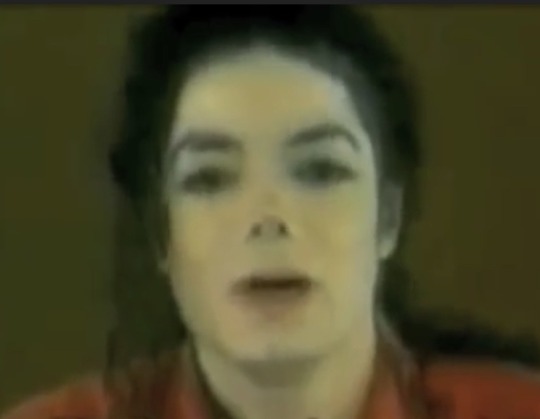
“THE CHANDLER’S MONETARY DEMAND”.
1• “The Chandlers demanded $20 million dollars from Michael, which he refused to pay. They even, at one point, agreed to go away for 1 million, chump change for MJ. He didn’t comply with any of their monetary demands or to pay for Evan’s script writing deals.” — @itsdeboleena_
https://themichaeljacksonallegations.com/2016/12/26/the-chandlers-monetary-demands/
2• “The fact that Michael Jackson settled out of court with his first accuser in 1994 is often brought up against him as a sign of guilt. The settlement and the events leading to it will be discussed in detail in a later chapter (The Settlement). Those who characterize the settlement as “hush money” do not realize that, had Jackson really wanted to “hush” his accuser, he could have done so BEFORE THE ALLEGATIONS WENT PUBLIC and BEFORE THE AUTHORITIES WERE INVOLVED ! In fact, the accusing side’s GOAL WAS TO GET A PAY-OFF from the very beginning. It is clear that the reason they turned to the public and the authorities with their allegations (indirectly, by capitalizing on the rule that all psychiatrists must report allegations of abuse) was because they did not get the pay-off they desired.” – “The Michael Jackson Allegations”, WordPress.com
3• “Before disclosing their allegation to a person mandated to report the alleged abuse (a psychiatrist), and going public with the allegations, Jordan Chandler’s father (Evan Chandler) demanded money from Michael Jackson. In his book, All That Glitters, Jordan’s uncle, Ray Chandler vehemently denies that the demand was an act of extortion and prefers to call it “negotiations”. Whatever you want to call it, this is how it went: According to Ray Chandler’s book, All That Glitters, with Dr. Mathis Abrams’ letter in his hand, Evan attempted to “negotiate” with Michael Jackson and wanted to do so alone. In the chapter entitled “August 1” the book states: “Although Evan was certain Michael’s actions toward Jordie were harmful, he still did not believe them to be intentional. As twisted as Michael was, Evan believed Michael genuinely cared about Jordie, and that if he could talk to Michael alone and explain his concerns, Michael would understand and together they could work out a solution, “without the damn lawyers.” [1; page 99]”... – “The Michael Jackson Allegations”, WordPress.com
4• “Jackson, however, refused to negotiate with Evan “without the damn lawyers”. According to ‘All That Glitters’, Jordan’s step father, David Schwartz had already delivered the news of the Abrams’ letter to Jackson’s private investigator, Anthony Pellicano, so Jackson already could suspect that Evan was up to something. Additionally, Jackson had already listened to the Taped phone conversations between Evan Chandler and David Schwartz on July 8, 1993. Nevertheless, Jackson agreed to meet with Evan but only in the presence of his lawyer, Bert Fields or Pellicano. The telephone conversation between Evan and Jackson is described as follows in ‘All That Glitters’ : “I just want to find out what’s going on between you two,” Evan explained. “You don’t need a lawyer. We can work this out ourselves.” But Michael wouldn’t budge: Pellicano or Fields had to attend. “We may talk about some embarrassing things for both of you,” Evan cautioned. “Anything you say to me, you can say to Bert,” Michael insisted. “But I don’t think anyone else should hear these things. I don’t want you to get in trouble. I just…” Click. This phone call was a turning point for Evan. “I understood that a man in Michael’s position needed lawyers for everything, but this was not business, not to me. I really thought we could work it out if we could get all the lawyers out of the picture, and I thought Michael would want that too. If I wasn’t bringing a lawyer, why did he need one?” [1; page 100]”... – “The Michael Jackson Allegations”, WordPress.com
5• “The meeting took place on August 4 at the Westwood Marquis Hotel. Present were Michael Jackson, Anthony Pellicano and Evan and Jordan Chandler. According to Mary A. Fischer’s 1994 GQ magazine article:
“On seeing Jackson, says Pellicano, Chandler gave the singer an affectionate hug (a gesture, some say, that would seem to belie the dentist’s suspicions that Jackson had molested his son), then reached into his pocket, pulled out Abrams’s letter and began reading passages from it. When Chandler got to the parts about child molestation, the boy (says Pellicano), put his head down and then looked up at Jackson with a surprised expression, as if to say “I didn’t say that.” As the meeting broke up, Chandler pointed his finger at Jackson, says Pellicano, and warned “I’m going to ruin you.” [2]”... – “The Michael Jackson Allegations”, WordPress.com
6• “The hug is mentioned in Ray Chandler’s book as well: “Evan then walked over to Michael and embraced the star with a big, happy-to-see-you hug, patting him on the back like an old friend.”[1; page 102] And then it is explained in a peculiar way:
“In an interview for Vanity Fair, six months after the Westwood Marquis meeting, Pellicano drew attention to the fact that Evan hugged Michael at the start of the meeting.”If I believed somebody molested my kid and I got that close to him, I’d be on death row right now.” Supposedly this means that because Evan didn’t kill Michael right then and there, he really didn’t believe the molestation occurred. Pellicano, of course, would have us believe Evan had already accused Michael of molesting Jordie as part of an extortion attempt, so when Evan hugged him it showed he knew Michael had done no such thing. But if Evan went there to extort Michael, why would he start off by giving him a big hug? Why would he act friendly? Wouldn’t he at least pretend that he believed Michael had molested Jordie and that he was angry? Especially with Michael’s audio expert/private investigator present as a witness! That Evan walked into the meeting and gave Michael a big hug only corroborates that Evan went there with the belief that Michael genuinely cared for Jordie and hadn’t done anything intentional to hurt him. After all, the idea that Michael was being accused of intentionally harming the boy — that a “molestation” had occurred — did not originate in Evan’s mind. It was Anthony Pellicano and Bert Fields who first used the term.” [1; page 107]” ... – “The Michael Jackson Allegations”, WordPress.com
7• “How many parents would give the person whom they suspect to have molested their child a “happy-to-see-you hug” and would “pat him on the back like an old friend”? And how many parents would have to “pretend” to be angry with the alleged molester, instead of genuinely be angry? Another remarkable aspect of the above quoted text is Evan’s apparent attempt to refrain from the use of the term “molestation”. Remember, this meeting took place after Jordan allegedly already “confessed” to Evan about having been molested by Jackson . “On July 11, 1993 Jordan Chandler, who was residing with his mother June Chandler, went to visit his father for a week but at the end of the week Evan Chandler refused to return the boy to his mother. This was the week when Jordan’s allegations against Michael Jackson began to take shape. The Chandlers claimed that the boy’s confessions of abuse were made after Evan sedated him for a minor dental procedure (pulling a baby tooth) with the help of his Anesthesiologist and friend, Mark Torbiner on July 16, just one day before Evan was scheduled to return his son to his ex-wife. According to the Chandlers’ story, as presented in Ray Chandler’s 2004 book All That Glitters, after Jordan emerged from the sedation Evan pressured him to “confess” and corroborate his “suspicions” that Michael Jackson had sexually molested him. The boy refused. Then Evan started to blackmail him with lies and threats against his friend, Michael Jackson.” ... – “The Michael Jackson Allegations”, WordPress.com
8• “Jackson and his people understood that Jackson was being accused of child molestation, even if Evan was careful not to make that accusation himself. At the Westwood Marquis Hotel, Evan had only read Dr. Abrams’ letter, he did not make any accusation in his own words. Apparently, Evan and his attorney Barry Rothman were trying to make sure that Evan could not be sued later if the allegations were proven to be false. Actually, according to Ray Chandler’s book, Rothman warned Pellicano on August 1, that Evan could not be sued even if the allegations were found to be untrue: “But Barry Rothman was not intimidated. He informed Pellicano that Evan had made no public statements of defamatory remarks about Michael in any way. And further, that Evan, as a dentist, was a mandatory reporter governed by the same requirements as any licensed health professional. Not only was he required to report his suspicions to the proper authorities, but he could not be sued for doing so even if they turned out to be incorrect.” [1; page 100] .” ... – “The Michael Jackson Allegations”, WordPress.com
9• “According to ‘All That Glitters’, a day after Rothaman warned Pellicano that Evan could not be sued even if the allegations were found to be false, allegedly Pellicano called Rothman and “announced he had a way of working everything out. Michael would help Jordie and Evan “reestablish their relationship” by assisting them in setting up a screenwriting career. That way they could spend lots of time together doing what they loved best.” [1; page 101]. According to the book, this offer was the first thing that Evan brought up at the Westwood Marquis Hotel on August 4, but Pellicano denied making the offer and it became clear that he was not willing to offer him anything. According to ‘All That Glitters’ , this made Evan “frustrated by Pellicano’s attitude, and Michael’s apparent condoning of it” [1; page 102-103] and Evan allegedly told the entertainer that he knew what he had done to Jordan and that the boy had confirmed it. The book claims “Evan then asked his son to confirm that he had, and the boy nodded affirmatively” [1; page 103], to which Jackson looked straight into Jordan’s eyes and said: “I didn’t do anything.”[1; page 103]” ... – “The Michael Jackson Allegations”, WordPress.com
10• “Allegedly, for Evan this was “the defining moment”:
“For Evan, it was the defining moment. “I knew Michael was screwed up, but until that point I wasn’t sure where he was coming from. Part of me still believed he was genuinely in love with Jordie and was acting innocently out of a warped mind, without any forethought or cunning. “But his smile was chilling, like the smile you see on a serial killer or rapist who continually declares his innocence despite mountains of evidence against him. I knew it immediately; Michael Jackson was a child molester! It was suddenly so obvious, June had been fooled, Jordie had been fooled, and I had been fooled. The entire world had been fooled by this pitiful creature with a brilliant but criminal mind.” [1; page 103]” ... – “The Michael Jackson Allegations”, WordPress.com
11• “According to ‘All That Glitters’ , Jordan “confessed” to Evan on July 16, yet Ray Chandler describes this moment on August 4 as the defining moment; a moment in which Jackson looked into Jordan’s eyes and said he didn’t do anything. We are to believe that this is what convinced Evan that Jackson was a child molester? Not that his son had earlier “confessed” to him? Ray Chandler closes the account of the meeting by stating: “Evan felt victorious. Not because he had won anything, but because he had finally solved the puzzle. Not only had there been sex between his son and Michael, but he now understood Michael’s true feelings. He had glimpse into the man’s heart, and it was not a pretty sight.” [1; page 104]” ... – “The Michael Jackson Allegations”, WordPress.com
12• “Jordan allegedly “confessed” to his father on July 16, but according to this storyline Evan “solved the puzzle” only on August 4, and does that by interpreting Jackson’s denial in a rather peculiar way. Evan’s new conviction, however, didn’t prevent him from continuing his “negotiations” with Jackson. After the Westwood Marquis Hotel meeting, Pellicano was invited to meet with Barry Rothman and Evan at Rothman’s office and that is when Evan and Rothman made their $20 million demand.” ... – “The Michael Jackson Allegations”, WordPress.com
13• “Ray Chandler’s reasoning for that is: “Evan had two goals. First and foremost was the welfare of his son. On the surface Jordie seemed fine, but this wasn’t surface stuff. Dr. Abrams had expressed deep concern for the boy and left Evan with the impression that serious damage might already have occurred. [Note: Dr. Abrams had not met Jordan yet at this point. Evan refers to Dr. Abrams’ letter here, which was in answer of the version of events that he and his lawyer presented to Abrams.] Evan hoped for the best but needed to prepare for the worst. If Jordie needed long-term counseling it could be expensive, and they would have to find a state that did not require psychotherapists to report child abuse to the authorities. That could mean relocating and closing his dental practice. How would he support his family? A worst case scenario to be sure, but possible. Soured by his experience with Pellicano and Michael — in particular, “Michael looking into Jordie’s eyes and denying their intimacy” — Evan’s second goal was to punish Michael. “I didn’t want him to get off scot-free. But a few million is chump change to him. I figured twenty million was definitely punishing amount. At the very least it would give him something to think about. If it turned out Jordie was okay and didn’t need a lot of counseling, so much the better. He’d be set for life. He deserved it after what Michael did to him. “And it wasn’t just the sex part. Everyone made a big deal about the sex – the press, the cops, the DA. That was important, sure, but it wasn’t the main thing for me. It was what Michael did to him to get to that point. He took over his mind and isolated him from his family and friends and everyone he cared for. He made him his own little slave. On the outside it looked like he was showing Jordie the time of his life, but on the inside he was robbing him of his individuality, his soul. That was the real crime, and that’s what I wanted Michael to pay for.” [1; page 108-109]” ... – “The Michael Jackson Allegations”, WordPress.com
14• “Others have differing account about where the $20 million sum demanded by Evan (who was an aspiring screenwriter) came from. On August 28, 1993 the Los Angeles Times wrote: “Film industry sources have said that the boy’s father sought a $20-million movie production and financing deal with Jackson.” [4]. A friend of Jackson, painter David Nordahl elaborated that in an interview he gave to the Reflections on the Dance website in 2010: “I was working on sketches for his [Jackson’s] film production company, called Lost Boys Productions. Sony had given him (Michael) $40 million to start this production company and that little boy’s dad (Evan Chandler), who considered himself to be show business material, because he had written part of a script. After that he considered himself a Hollywood screenwriter, and being friends with Michael and his son being friends with Michael, this guy had assumed that Michael was going to make him a partner in this film production company and that’s where the $20 million figure came from. He wanted half of that Sony money. It was proven. It was an extortion. Michael listened to his business advisors and they all told him to keep his mouth shut and to go on to Korea, go on with your tour, you’re in the middle of a tour. We’ll take care of it.” [5]” ... – “The Michael Jackson Allegations”, WordPress.com
15• “Back to Evan Chandler’s opinion that $20 million was “punishing amount”: why not leave punishment up to the proper authorities? The answer in ‘All That Glitters’ is that Evan thought they would not believe them and he was concerned about the publicity that the allegations would bring. Ray Chandler writes about that concern: “It wasn’t just after the fact that Evan made these claims. He expressed his fears about a public airing on Dave’s secret tape, six weeks before the affair became public. “It’s gonna be bigger than all of us put together, and the whole thing’s just gonna crash down on everybody and destroy everybody in its sight.” His son and himself included.” [1; page 109]”... However, there’s a problem with this claim. In the taped phone conversation between Evan and David Schwartz, and in the context, that statement wasn’t an expression of concern. On the contrary... – “The Michael Jackson Allegations”, WordPress.com
16• “DAVE SCHWARTZ’ SECRET TAPE :
CHANDLER: It’s unfortunately gonna be too late, then, and nothing’s gonna matter at that point.
SCHWARTZ: Why?
CHANDLER: Because the fact is so fucking overwhelming –
SCHWARTZ: Yeah?
CHANDLER: — that everybody’s going to be destroyed in the process. The facts themselves are gonna – once this thing starts rolling –
SCHWARTZ: Yeah.
CHANDLER: — the facts themselves are gonna overwhelm. It’s gonna be bigger than all of us put together, and the whole thing’s just gonna crash down on everybody and destroy everybody in its sight. That’s [tape irregularity] humiliating, believe me.
SCHWARTZ: Yeah. And is that good?
CHANDLER: Yeah. It’s great.
SCHWARTZ: Why?
CHANDLER: Great, because ...
SCHWARTZ: I mean, is that how you’re –
CHANDLER: Because June and Jordy and Michael –
SCHWARTZ: Yeah.
CHANDLER: — have forced me to take it to the extreme –
SCHWARTZ: Yeah.
CHANDLER: — to get their attention. How pitiful, pitifuckingful they are to have done that.”[3]” ...
– “The Michael Jackson Allegations”, WordPress.com
17• “According to ‘All That Glitters’ , Rothman was convinced that Jackson would not pay $20 million, so he tried to talk Evan down to $5 million, but Evan was intractable because he believed “five million was a pay-off, not a punishment.” He wanted Michael punished for what he now believed was a blatant molestation.” [1; page 109]. According to the book, on August 9, Pellicano came back with a counteroffer of $1 million to fund three screenplays written by Evan and Jordan. Later Pellicano stated he did that to be able to record the Chandlers negotiating for money and indeed there were tapes that Pellicano later produced of these phone conversations. Evan turned down the $1 million, expecting a bigger offer. Then, on August 13, Pellicano’s next offer, which made it clear that Pellicano was rather just keeping them in check to be able to record them on tape while negotiating about money, not seriously bargaining, shocked Rothman and Evan: $350,000.” “Barry Rothman couldn’t believe his ears ! Pellicano was completely ignoring the rules of the game. Barry started at twenty million, Pellicano had countered with one million, surely the next number should be somewhere in between. And strange as it was that Pellicano had lowered his million dollar offer, it was even crazier that he refused to reinstate it when Barry told him that he had “busted [his] hump for three days…getting Evan to hopefully agree.” [1; page 117-118]. – “The Michael Jackson Allegations”, WordPress.com
18• “According to the book, on August 17, Pellicano called Rothman to find out if Evan accepted the offer : “Barry Rothman told him no, but suggested again that Evan might be willing to take the original million dollar offer if Pellicano was willing to renew it. “It’s never going to happen,” the investigator insisted.” [1; page 121]. The day before, on August 16, June Chandler’s attorney, Michael Freeman informed Rothman that they had filed a motion for a Court Order to have Jordan returned to his mother, June Chandler. In response to that and frustrated by Jackson’s refusal to pay him off, on August 17, Evan took Jordan to Dr. Mathis Abrams where the boy made his allegations against Michael Jackson, which inevitably involved the authorities and afforded Evan the ability to get custody of Jordan.” According to ‘All That Glitters’ : “In a phone conversation the night before Attorney Freeman’s request was to be heard in court, Barry Rothman counseled Evan that unless he was willing to walk into the courtroom and accuse Michael of molesting Jordie, he didn’t have a prayer of winning; June had legal custody and that was all she needed to get Jordie back.” [1; page 119]” ... – “The Michael Jackson Allegations”, WordPress.com
19• “If one were to follow the above events, it is clear that Jackson had plenty of opportunities to pay off the Chandlers, had he really wanted to, before the case went public or to the authorities. He chose not to do so, which baffled Evan ! Ray Chandler writes in his book:
“Fields and Pellicano already knew Evan was willing to negotiate. Why not pay him off and nip the nightmare in the bud while you’ve got the opportunity? Especially when you know your man is guilty of sleeping with little boys, at least. Not only do you avoid a civil suit, but also, more important, you buy your way around authorities by removing their star witness. Ten, twenty, thirty million? Money’s no object. The deal could be a fait accompli within hours. And if it doesn’t work, you can always come out swingin’ anyway.” [1; page 126]”. And : “On the morning of August 17, 1993, as he negotiated with Barry Rothman, Anthony Pellicano had in his possession a copy of the psychiatrists report with the names omitted. He held in his hand the future of the most famous entertainer in human history. Yet the tape is replete with examples of Pellicano refusing to compromise on what would amount to chump change to Jackson. Why take the chance of Michael’s name ending up on that report and triggering an investigation?” [1; page 138]”... – “The Michael Jackson Allegations” WordPress.com
20• “Whether you use the term extortion to describe the above events or not, Ray Chandler closes the chapter about the “negotiations” with a standalone paragraph, as if to summarize the chapter and emphasize:
“Had Michael paid the twenty million dollars demanded of him in August, rather than the following January, he might have spent the next ten years as the world’s most famous entertainer, instead of the world’s most infamous child molester.”[1; page 128]”
YES , this is coming right from THE ACCUSER’S FAMILY ! Meanwhile, please remember how Jordan’s allegations emerged: his father threatened and pressured him into saying what he (the father) wanted to hear. The same father who then used these allegations to try to “negotiate” with Jackson for money.” ... — “The Michael Jackson Allegations”, WordPress.com
1 note
·
View note
Text
Billie Marten Interview: Quiet Confidence

Photo by Katie Silvester
BY JORDAN MAINZER
“Where are you calling from?” I asked Billie Marten during our Zoom last month.
“East London,” she replied, “Like everyone else,” simultaneously rolling her eyes at and embracing the scene in which she’s found herself embedded.
The 22-year-old’s wry sense of humor, observations, and self-awareness complement the earnestness she’s shown on her three LPs, especially last month’s terrific Flora Fauna (IMPERIAL/Fiction Records). Though the rawer aesthetic of the record was influenced by a spontaneous, drunken purchase of a bass guitar, and many of the album’s instrumentals were fleshed out in the studio with producer Rich Cooper, Marten both dug deep within her psyche and branched out to the world around her to tackle the album’s themes of self-care and empathy. Opener “Garden of Eden” doesn’t waste any time, its drums rumbling and guitars scraping as Marten compares caring for people to tending to plants. It’s a sentiment that hits even harder after a year-plus of lockdown-induced isolation, when for many of us keeping our pets and plants alive was the only thing we felt like we could control. Throughout the record, Marten’s honest about her relationship with herself, relatable in her alternating between endurance and self-doubt. “Trying hard to teach myself a lesson / Give my body patience to bree free,” she sings on the hip hop-influenced “Heaven”; even if a partner or folks in the world around her think they’re already self-actualized, Marten’s looking out for her own mental health. On the flipside, a chaotically fuzzy stomp like “Ruin” has Marten declaring that treating others like she treats herself would be bullying: “Got a war with my body / Never win, never lose,” she sings desperately.
Flora Fauna is much more than a collection of the good days and the bad days, though. Marten communes with all sorts of living things, from street pigeons to gardens. And perhaps the most consequential song on the album is “Human Replacement”, a song about women not being able to walk alone at night, inspired by a seemingly increasing rash of violent attacks on women in the UK over the past few years. In its juxtaposition of infectious groove and essential, in-your-face subject matter, it reminds me of U.S. Girls’ weighty “Incidental Boogie”. For Marten, putting herself in others’ shoes, in a sense, allows her to become something else. On minimal closer “Aquarium”, over strummed acoustic guitar, she sings, “Do you wanna go to the aquarium? / I feel I lately wanna drown / Sit down, stare out, shut up, and swim around.” She’s able to nurture an environment by immersing herself in it, like how dirt finds its way on her face and between her teeth on the album’s cover.
Marten’s getting ready to get back out there, with some festival dates in the summer and a UK tour in July. For now, she’s relishing reflection and admissions. Towards the end of our interview, in which she had her camera on but I didn’t, she told me, “I like that your camera’s not on. It feels like I’m in a confession booth.” Flora Fauna’s got to be the greenest confession booth in the world.
Since I Left You: How did you approach the order of the tracks on Flora Fauna?
Billie Marten: I definitely wanted it to follow the classic storyline writing/curve. “Garden of Eden” starts off with the plant, everything’s open, and you really get the main feel of the album there, and “Creature of Mine” is twisting you up to this darker, punchier world, and “Human Replacement” is very in-your-face. “Liquid Love” would be the plot twist. Then, eventually, we float down to the second side of the album and get back into that acoustic-y world slightly more, but it’s definitely still different from the first two albums. Laid bare with nothing but an acoustic...on the last song of the album. I love that it’s quite a loud beginning but very quiet ending, which is what a lot of album campaigns end up being. You’re selling this thing you’ve made for two years, and it’s all, “Look at me, here I am, here’s what I’ve been doing, here’s how much better I am.” That air of improvement has to be there. But in the end, it is what it is. Take it or leave it. I’m not a naturally outgoing, competitive person, so I quite like finishing it with an air of quiet confidence rather than being brash and loud.
SILY: "Garden of Eden” almost has its own quiet confidence. It starts like you’re already in the middle of a conversation.
BM: I definitely wanted it to be immediate, like you’re dropped into my life without any warning. Have you seen Soul?
SILY: Yes.
BM: What did you think?
SILY: I thought it was very good. What about you?
BM: I loved it, and I thought it was the best philosophical education you could have in two hours. It made me think of it that way, because he drops to the real world. I wanted that feeling here.
SILY: I read an interview you did that had the title “We really are just plants,” and I was thinking that while reading about the record before it came out and eventually listening to it. Was it important for you to start the record with a song that compared us to something that’s also living but we don’t always think about as living?
BM: Absolutely. Well said. We’re actually really easy to take care of. That’s why I wanted to simplify it down in the melting pot. Take away emotion from it. In the end, we just need water and light and a bit of space, but not too much, to survive. I was very aware of that whole concept. Especially in London, it’s, “Look how much I’ve grown or will be growing in the future,” not, “How’s everyone else doing? How’s your soil?”
SILY: On “Liquid Love”, you sing about “wanting to wake up as a human every morning.” Does that song point to an eternal optimism?
BM: That was very much an affirmation type line for me. That line about waking up every morning was about how glad I was able to do that, because not everyone gets to do that for a long time. The song’s a love/hate relationship with drinking, which I was doing quite a lot of in the first few years of music. I get hangovers really badly. It doesn’t take me a lot to be completely out of action for the entire next day. That line was about just waking up and feeling proper and normal as a human, because I’ve spent a lot of days not being able to function, and it was really getting to me. We rely on our conscience to remind us to take care of ourselves all the time.
SILY: Is your relationship with drinking now different?
BM: It’s definitely a lot better, and I’m a much happier person. I don’t use it the same. I don’t need it in my life; I just enjoy it. 80% of us probably have the same struggle with it. It’s something you can control, and something that takes us out of real life entirely. It takes up your attention for hours and hours at a time. It’s an incredible mask for genuine problems. With music, it’s around a lot of the time. Some people just can’t function without it. I have big realizations all the time. My body’s telling me to stop doing it and stop smoking as well. I keep getting tonsillitis every month. I think it’s its way of saying to chill out.
SILY: The theme of being able to control certain things seems to pervade the record. It relates to nature, too. On the album closer, your garden seems to represent a balance, a place where you can influence nature but not control it.
BM: I have a really strong urge to protect an environment. I use the word cradle a lot. It’s important that humans can do that with other ones. I wanted that side of confidence I’ve developed but to let people know it’s okay to be and remain vulnerable. I think those are some of the best sides of people. If I think of my friends, I don’t think of them as who they are when they know they’re being watched. I tend to think of what they’ve been through, their low points, who they are when they’re being honest. “Aquarium” is very much that sort of confessional poem.
SILY: There are other natural entities in song titles on here that symbolize something, like “Walnut” and “Pigeon”. I think I read the latter is a yoga pose?
BM: No. I was literally referring to the one-legged pigeons that hang around London that are all gammy and rough and ready and tough characters.
SILY: The pigeon is really smart and historically used for a lot but we think of them as rats.
BM: They’re complete vermin.
SILY: It’s almost like the way we treat nature and/our ourselves.
BM: Exactly. There’s such a different between a rural pigeon and a capital city pigeon. They’re almost completely different species. It’s funny. I’m getting a lot of misconstrued things coming out of this record, people saying I’ve left London, I’ve found spirituality, the pigeon thing. All of these things just aren’t true.
SILY: That’s sometimes a good thing. Of course there’s a line where someone says something completely wrong and claims it to be true, but do you like in general for people to be able to interpret your lyrics the way they want to?
BM: Yes. I’ve had a lot of experience [with the former], especially because we’re doing these things on Zoom, and then you read the written piece and it’s so different from how the conversation went. It’s an interesting social experiment. But I love when people take images and phrases and meanings for themselves and make them their own. It’s a great sign someone’s getting something from your music even when it’s not happening in your head.
SILY: On “Creature of Mine”, that post-apocalyptic, “this is our last chance” type vibe--Is that a scenario you often entertain, and how do you feel about it?
BM: I’m a sucker for diving deep into rumination in a very large, existential plane. Thinking just spirals until it gets bigger and bigger and you get to a point where you’re completely irrelevant. Like watching Cosmos or David Attenborough. [It puts] your existence into a tiny hole. I think sometimes that’s really positive because it helps me understand when I’m nervous for a performance or gig, it’s good to put yourself in perspective. However, it sometimes makes you not want to do things because they’re ultimately not important. It’s a fine balance with that style of thinking. It’s automatic for me. It’s my constant thought train.
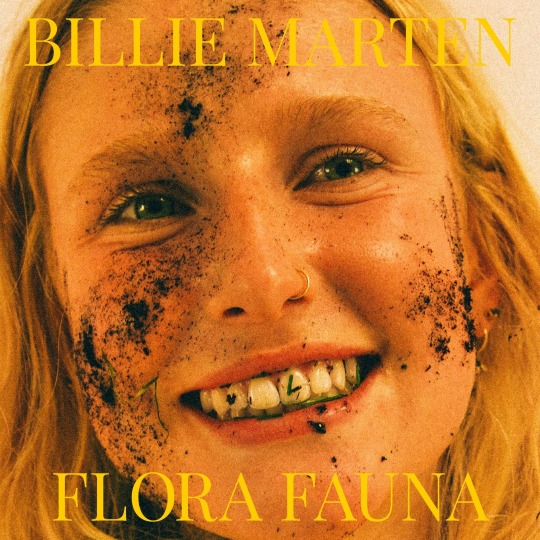
SILY: Are there other places on the album, even if not in the same context, where you refer to that spiraling thought process?
BM: I think “Ruin” is especially difficult in that I was noting down my thought process, and that’s what the verses are. I don’t know why I do it, but it makes me feel good. I needed to do that to get it out of me and understand how ridiculous that thought train is. The chorus tries to put this analogy of [wasting] time being a crime. That’s what I was doing: I was wasting a lot of time thinking about it, so every time I sing it, it’s a weird slipstream universe type thing.
SILY: I asked the question hoping you would say “Ruin”. When you sing, “Got a war with my body / Never win, never lose,” it reminded me of that thought process. It goes in a circle. It’s not a linear thing.
BM: There’s no point in putting an element of battle into it. There’s no opponent. It’s just you. You could try and find opponents with other people, but that doesn’t usually work out either. This whole album is fleshing out these huge subjects I ultimately have no control over. Putting my two cents in and leaving it at that, making these musical, experimental creations.
SILY: “Human Replacement” seems to be one where the juxtaposition between the instrumentation and subject matter is sort of contrasting. It’s this funky strut, but the song’s about women feeling and being unsafe alone at night on the streets. Were you conscious of that contrast making that song?
BM: Me and my producer [Cooper], that was the first song we did together in this album, so it needed to come out very immediate. I just had that [sings melody], and he sat on the kit just trying it out. I had no idea what I wanted to talk about. I was going into this Queens of the Stone Age, grungy, late-night mood. I didn’t have the narrative because what they sing about wasn’t relevant to me. I was looking outside and hearing all the sirens and hearing about what was happening in the news every day, and it was a subject that needed to happen. I wouldn’t say I’m in any way a political writer, but it is a massive problem. It’s a shame that narrative came out of me. The subject matter had to match the severity of the song. I couldn’t really talk about my own feelings in that song. It had to be a bigger subject.
SILY: Are songs like those more or less difficult to perform live?
BM: I don’t know. I worried about playing that one live because it’s so serious. My between-song chat is very much not serious. It’s my personality, which is who I am when I’m not performing. So I was worried I wouldn’t give it the air time it needs. Then again, most people don’t even listen to lyrics. They just like the way a song feels. It’s important to entertain those people as well. It can’t be all doom and gloom. I would say it’s harder than talking about myself, which I’ve been doing since I was 12.
SILY: How was playing your gig?
BM: It was at Banquet [Records], a record store in South London. I thought we were gonna be in the actual shop, me and my long-term collaborator and bandmate and TM Jason. He just makes a bit of [drum] kit, and I’m on acoustic. It turned out to be in this proper venue in this theater. It was a gig. I’m really glad we got pushed into that environment. Anything else would have been a lot more daunting.
SILY: Was it your first time playing many of these songs?
BM: Yes. There are still ones I have no idea how to play. I need to figure that out quite soon. [laughs]
SILY: Are you looking forward to touring?
BM: Yes. Massively. I really needed this break to make me realize that because I think gigs can be really hard for people. I definitely find that. There have been certain moments where I wish I wasn’t going on stage. Now it’s just like we have been given this gift again of living normally. It would be incredibly inappropriate to feel otherwise.
SILY: What else is next for you?
BM: Definitely writing. I want to start recording again. I can do it now since we’ll be so busy. It’s shaping up into a completely different soundscape again, which is interesting. You’re always going.
SILY: Anything you’ve been listening to, watching, or reading lately that’s caught your attention?
BM: This band called Coco. I don’t even know how I found them. They’ve got no information about them whatsoever. I think they’re American. They have 3 songs on Spotify. They’re very very good. To be honest, I’m not very good at watching things at the moment. I watched Nomadland and loved that. Mostly it will always be The Simpsons. To be honest, I’ve been too busy recently. I’ve been looking forward to June. Wait, we are in June! It’s the 2nd day of June. Well, I’m looking forward to this month, where I can do more domestic things again and stop talking about myself. [laughs]
youtube
#interviews#billie marten#banquet records#flora fauna#katie silvester#zoom#rich cooper#u.s. girls#soul#cosmos#david attenborough#queens of the stone age#coco#spotify#nomadland#the simpsons
1 note
·
View note
Text
Play that funky music...
About a week ago I was walking from home to the train station, with the frost forcing me to tactically place my feet as I walked so as not to slip and fall. Most of the way I was able to walk on the grass peeking out from under the gates of residential properties. Even with the frost, the texture of grass is much friendlier than the slickness of pavement.
I was nearly at the steps up to the station when I thought, “Ha! Home free!” Of course, the second I stopped paying attention to my feet, I fell. My natural inclination was to curse the municipality for failing to salt the sidewalk, but, me being me, my thoughts led to, “but what about eutrophication? What about over-salinization of waterways? Soil??? What. are. the. consequences?!” And then all those split-second thoughts collapsed into, “...what if sidewalks were designed with more texture in mind?”
You encounter those situations often in life. One problem is solved, but solutions beget more problems, and so on, until you’re spiralling into a rather ridiculous situation where your problems become inflated and you’re trying to get a grip on things when the whole matter could have been avoided in the first place.
With regard to writing and argument, many university professors prefer shorter works and will actually penalize you if you write beyond the set limit. But those are exercises in logic and persuasiveness - I’m attempting something a bit different. The second-to-last thing I wrote was nearly ten pages long according to my word processor. I could have written a lot more, but I was afraid of overwhelming people. However, it seems that my writing is easy enough to follow and it wouldn’t be a terrible thing if I went on longer, so I’ll do that this time. I’m happy to do that, ‘cause there are a lot of tiny pieces that make the puzzle.
And again, I want to add a few notes regarding my one of my previous posts (the one about mental health was something like a short performance during an intermission). Looking back, I think these addenda actually tie separate posts together nicely. (Initially I had the word ‘little’ in front of ‘addenda’ but once I reviewed what I actually wrote, I don’t think ‘little’ is the right descriptor...)
The observation that ‘responsibility to others is necessary’ is not my own. Dr. Jordan Peterson (the infamous U of T psychology professor) has championed that as medicine for the modern existential crises many people find themselves falling into. He also tends to critique ideological thinking. I purposely didn’t mention his name, not to take credit for his ideas, but because I wanted to protect myself, and to protect the ideas. I wanted them to stand alone per se, so that everyone could reflect on where taking on more responsibility to others might aid them more than they thought. Peterson has influenced my thinking enormously and I didn’t want the leftist radicals to rip my head off because some of his opinions are highly controversial (and because I am, in a way, an ally to them, and I really do value some of the things those people have to say). If you’re interested, look him up, but if you do, please look carefully. I’ll comment on the theme characterizing his relationship to social justice later in this post.
I generally see Dr. Peterson’s views as rather optimistic, but with respect to certain issues I feel this optimism is misplaced. Two reasons why:
a. He attempts to justify economic inequality generated by capitalism via the ‘paredo distribution’ (Google it). The graph is apparently a pattern that economists have discovered, which reflects the natural flow of more money into the hands of people who already have it. And this is generally understood: the more capital you have, the easier it is to take risks and to invest and thus generate more capital. And if that behaves as some kind of ‘economic law’ or inescapable trend, then why challenge it? But of all the lectures and interviews I’ve watched on YouTube, I don’t think I’ve ever seen him concede that this distribution pattern might be exaggerated because of dishonesty and historical oppression, which altered the playing field tremendously, so much so that levelling it seems nearly impossible - and that we are still paying for it today all whilst battling the new emerging monster that is post-modern capitalism (which is ironically fuelled by our appetite for social media).
The most obvious global example is the “slave trade”. Not only was most of the continent of Africa torn into pieces, its own people were taken from their homes and sent across an entire fucking ocean, in an attempt to distribute its riches, which were never for the taking in the first place. So while the description of ‘whiteness’ as privilege is inaccurate as it is too broad and too narrow at the same time, the feeling of guilt some people feel because they were simply born into a culture that has its roots in colonization is a very real problem. And any Canadian who’s encountered the news at some point in the last few years knows that this problem is alive and well, still kicking at the backdoor of Indigenous communities.
The specifics of dishonest profit-making: inexcusable wages, horrendous working conditions (even in North America), the ruin of families because workers are sucked away to do hard labour instead, the evaporation of opportunity for self-determination, the inability to basically breathe, and, the clincher: the manufactured DEPENDENCY on all of this. And that’s only in the spiritual realm - never mind the disastrous ecological situation.
People generally think of vegetation as a ‘renewable resource’. False. I mean technically, yes, you can plant more trees and you can grow more vegetation, but that’s only the case if your soil is of sufficient quality, and even then certain soils only permit certain kinds of vegetation to grow. Like a grassland versus a subalpine forest. And yes, soil and vegetation do have a give-and-take relationship, but the complexity of both the soil and of the ecosystem at large takes a VERY long time to develop, so long that it’s hard to even conceive of the time span if we were to overlay it with our personal lives.
When I first read (in an introductory forestry textbook) that soil, not the crop, is the true resource, it blew my mind. That’s because time constraints dictate our lives and they dictate what constitutes “renewable resources” and “non-renewable resources”. The problem wouldn’t be so bad if we could find a way to revive soil and bring it back to its authenticity (ie. its historical character, just before the pillage) once we’re done harvesting whatever crop we have. And farmers do do that to a certain extent; they rotate crops: some crops suck the nitrogen out of the soil, and some restore it. But you look at something like the Alberta tar sands, and never mind the fact that it’s an oil producer, but also that is ground we are never getting back, because that ground evolved in such a way that only the passage of time can allow. Erosion can take two forms: physical (many soils are stratified and if you dig a hole deep enough you can actually see the layers because they’re often coloured differently), and chemical depletion. And if you segregate excess biological matter so much that it cannot return to the soil, those locked-in nutrients aren’t going to just magically appear out of nowhere. That would violate our law of the conservation of mass.
And we’re not even talking about the little society that is the mature/old-growth forest. You can see a marked difference between tree plantations and natural forests. Part of the discipline of forestry is to observe the stages that occur in forest development, and it isn’t just “let’s go plant some trees in a barren landscape”. When you learn about the different qualities in a forest plot like its geologic traits and the way water moves through it, you have to use your powers of deduction to write some kind of backstory that explains the ageing of that young forest into old growth. The point is, the explanation is necessarily holistic.
Old forests are messier, and that’s because they’re like human societies in that they become much more complex over time. However, they don’t resist change-making elements. They change in accordance with the ebb and flow of Earth’s cyclical processes. By contrast, human-made structures require humans to tend to them, to restore the order that entropy has taken, to ‘heal’ natural erosion. Scientists concerned with the relationship between humans and the natural environment often encourage people to go into nature because it’s healthy. I don’t think that has as much to do with extra oxygen intake as it does with vibing the rhythms of nature.
Ok, I went on a bit of a tangent there but not for no reason.
I think Dr. Peterson really does want to see the glass as half-full rather than half empty but he also tries to paint capitalism in a more positive light by saying that people are less poor now than they were half a century ago. That may be the case, but then I wonder what got them poor in the first place? It was the idea that ‘this is mine just because [I got lucky and] I have the tools (money) to make it mine’, and the mindset that suppressed people don’t have inherent value and that another’s quality of life doesn’t depend on more than just money. And if you’ve got enough money and the investment offer you propose to a government is appealing enough, international borders, and the management of resources that’s supposed to fall within those borders, don’t matter either! It’s like breaking someone’s flower vase on purpose, gluing the bits and pieces back together, and then saying, “Look what I did for you! You owe me a thanks.” But of course, the people who did the vase-breaking and the people trying to repair the vase aren’t always the same people.
The other situation where I don’t think Peterson accounts for the entire truth:
b. Women. It sounds like most feminists hate him. I don’t think he hates women; I think he’s too preoccupied with figuring out the truth about things to resort to something like that. There are moments when he’s on the public stage where he’s actually moved to tears because of how passionately he feels about human suffering, and because of the gratitude people have toward him for his ability to motivate his listeners in fixing themselves. And I think the majority of his audience consists of young men, which some people look at and think “RED FLAG”. But the detractors don’t pay attention to the real reasons his ideas appeal to men because they think all men are one-dimensional creatures.
Anyway, when he thinks of feminism he thinks economically, and I guess that makes sense because the more money you have, the more freely you can act. And in that respect, for him, sexism doesn’t exist and the disparities we see between men and women in the workforce are because of inherent differences in male and female personalities - not that one is better than the other, but because they’re just different. But when I see people complaining that about someone being ‘relegated’ to a traditional female role (or they’ve been brainwashed into thinking those are the only suitable roles), it makes me wonder why those roles aren’t elevated to an importance equal to that of traditionally male roles. And the way I interpret the economics of feminism -- liberal feminism -- is that the traditional realm of the woman is left in the dust, and what we should all aspire to are masculine ideals, which, to me, isn’t really a good type of feminism at all!
But what’s ignored is this sort of...carnal...view of women that misogynists have, that has nothing to do with economics and everything to do with female sex organs, the female form, and the belief that because of all the things that make women women, they are purely inferior to everything considered “traditionally masculine”. You can be a financially successful woman and still experience an ancient sexism, latent or otherwise, which really is tied to your sexuality and to your ability to produce babies and further, the expectation that you will be the one to nurture them. And the ancient and the present clash violently sometimes. And I don’t have a problem with a lack of mercy toward true misogynists, but I do feel sorry for them because, can you imagine how they feel once they realize a woman is actually smarter and more capable than them?
So here I want to address the relationship between the individual and the communities the individual is a part of. I talk about individuals a lot and I think I have a very good reason for doing so. First of all, it’s cultural. I’m speaking from the point of view of a society in which the development of the individual is encouraged, and is a priority. We probably wouldn’t be able to relate to people from less prominent cultures who really do think first and foremost in group terms. And psychologically, there are few instances where a person, whose sense of individuality is fully formed, would be capable of transforming into something else (not to say that’s impossible though).
You may remember the link I provided in my last post, and if you read the article you’ll know that the degree to which a person sees themselves as an individual varies across cultures (and you’ll know how breath-taking and unexpected the connection between schizophrenia and individualism is). The author mentions a study involving Chinese citizens and Danish citizens, where researchers discovered that variations in notions of individuality are reflected neurologically. I can’t help but wonder if the diminished sense of autonomy observed in the Chinese participants had something to do with China becoming a giant of communism. This may be a case of the-chicken-or-the-egg, but the fact that the government under Mao committed huge human rights atrocities, which no average citizen would willingly invite into their homes, leads me to believe that the communist mindset would, if anything, be less attractive in the aftermath than when it was a novel idea. I obviously don’t know the whole history, so this is just conjecture. But then, compare that situation to the one in the United States where even the word “socialism” (communism-lite to some) sends people into a frenzy. And, arguably, contained in the American mentality is a very deep idea of independence from others. Canadian citizens are known (and I think beloved!) internationally for being more peaceful and more moderate than our southern neighbours. The word ‘socialism’ doesn’t hit a nerve with us like it does Americans, and I was always so puzzled why the S word was such a dirty word to them. Now it makes a little more sense... it’s psychological.
There is no sense in arguing what type of mindset is better or worse, ‘cause I think we’re sort of stuck with what we have. And what I say here isn’t meant to be universal, for obvious reasons. Anyway, the issue isn’t so much Individualism trumping the need for the betterment of the community, or sacrificing the realization of individual desires for community order, but that overall, the individual is inhabited by emotion, or otherwise that which compels you. And the feeling a person has is what causes them to act, and that is the first level of interpersonal change-making. And if an individual deviates from accepted moral behaviours, the onus is on them to pay the price. Pretty much everything else is external. The way you transform your individual feelings into something that the community might benefit from - and you SHOULD, because we place a hell of a lot of trust in strangers as we go about our daily activities - is to think that maybe, if you’re feeling something, someone else has felt the same. And the way you figure that out for certain is by trusting that a person will tell you, given that they’re allowed the opportunity to do so. I’m pretty sure Wittgenstein talked about this in his Philosophical Investigations.
It’s like when kids fall and scrape their knees or something. You don’t just assume that they’re not okay because they have an injury, you wait for them to tell you if they’re in trouble. If they pick themselves up and move on with the activity, you can trust that they are fine. One of the many things that are awesome about kids is that they don’t mess around; they’re not political and they haven’t yet assumed all those pretences that we adults have.
For a moment I want to explore what knowledge can do to morality. In this context I mean morality in the human realm, which I believe is more complicated than it used to be. Take war and refugees, for example. Even before social media we relied on journalists to provide us with accurate information about acute situations, like war. But we’ve become exposed to systemic, chronic injustices taking place in countries we think are technically functioning alright just because bombs aren’t going off and they’re not waking up everyday to the sound of machine-gun fire. We generally have knowledge that there are people somewhat unlike ourselves, in that they suffer because the quality of their lives is much worse than ours. We wouldn’t know about these things if not for global travel, and if not for the Internet.
So we feel something tugging at our heartstrings - can we do something about it? A relatively painless solution is to donate money. That works, but only when you have human agency thrown into the mix - money is useless without people. And NGOs, like any other organization, have their maximum operational capacities, and humans have maximum capacities too. So the question is, when do you give up your life for the sake of someone else’s, halfway across the globe? And does the information we have obligate us to do these things just as knowing our next-door-neighbour would (in theory) obligate us to help them when needed? And from that follows another question: how big should our jurisdictions--the administrators of public works and services--get before our neighbours become faceless?
So some prominent public figures like to warn people that “democracy is in trouble.” Um, no shit Sherlock! From the American point of view, I think what they’re referring to--other than corruption--is increased ideological polarization, with fewer people meeting on middle ground. And that’s to be expected: not only is a collection of individuals more powerful the bigger it gets, resulting in greater capacity to attract more like-minded people, but the Internet has made it very easy for such groups to be more visible, and then more accessible. Of course Americans are typically seen as more “extreme” than Canadians, and that view (fact?) contributed to the theory that the financial crisis of 2007/8 was harsher on the Americans than it was on Canada: the “all-in” was reflected in the propensity for US bankers to take greater risks in sculpting their neat little “financial packages”, whereas that was less so the case in Canada. (This is not my own theory, just something I learned in a random political science class.) Anyway, so the legitimized and dare I say, “civilized” channels of social change (ie. voting, writing to your local elected official) are increasingly being circumvented.
But if we haven’t already lost democracy, we are well on the way. People who instruct that YoU sHoUlD vOtE employ a paper thin definition of democracy that assumes the democracy of the ancients is the same as democracy in 2020, which it absolutely is not! First of all, if you consider the rural voter compared to one employed on Wall Street, the vote representing Wall Street reaches further than the rural one, and is more likely to be heard than the one representing rural lifestyles. So the illusion that “every individual gets one vote” may be a de jure truth, but is a de facto lie.
It matters where people collect themselves, and it matters what way entire industries vote, and it matters which industries are considered more important than others. After all, “the economy” is number one in political platforms, and if it’s not number one to individual voters, that’s because they operate on the presumption that they are sufficiently insulated from drastic changes in that realm, allowing them to focus on social issues instead.
And even if we’re not voting officially in elections, we can see how skewed “democracy” is, and how not all votes are equal, if we pay close attention to the issues that monopolize the media. While the purpose of media is provide us with information, it does also act like some kind of statistical sieve. I suppose the best (and easiest) way to maintain skepticism is to remind oneself that what you see on the daily news is only a tiny portion of what is happening in the world, and that is just its nature.
I had lunch with a friend on Boxing Day and she provided me with some statistics that basically compared the number of lives lost in our province due to drug overdoses, compared to the number of lives lost because of COVID infection, over the same time period. Deaths from ODs far outnumber deaths from COVID, but it’s obvious which issue has been dominating our psyches for months now. And why is that? It’s because the people who are likely to die from drug overdoses are “certain kinds of people”; drug use is their “identity”, and that through their “habits” they are segregated from the rest of the population. We believe, however, that COVID isn’t selective in the same way that overdoses are, and so more people feel the need to act, if only on a theoretical basis. But why would this discrepancy exist if the only thing we cared about was preserving the life of a person, no matter who it was? This is the rural road/Wall Street issue in another form.
Furthermore, the distance between voters and elected representatives has ballooned, though I couldn’t imagine it any other way. Never mind the obvious issue we have in Canada where we don’t vote directly for our Prime Minister--unlike the presidential elections in the US--we run into many obstacles whenever we try to get the government to bloody well listen to us. Anyone who’s dealt with Service Canada, or any bureaucracy for that matter, would agree. The point is objectivity and fairness--and fairness is a good but complicated thing--but the more heterogeneous your population becomes, the more difference in people you need to account for, and the looser and looser the language becomes! The details of any issue you need resolving become close to irrelevant. Like it’s no wonder political platforms are so generalized and vague. Maybe the loss of democracy engenders ideology because people want goals, they want inclusivity, justifiably, and they want things against which to measure the efficacy of politicians. But the specificity required to address the needs of a particular community is really hard to come by! If you really wanted to stay true to the origins of democracy you would decentralize everything, and the balloon separating voters and elected representatives would shrink, but that’s not going to happen. So we might as well loosen our grip on The Democracy Ideal and just call it something else.
That being said, it isn’t like federal governance isn’t useful, because even if you disagree with federalization the reality is that centralized governance makes possible the galvanization and coordination of resources and people that small, independently-governed communities would be unable to accomplish. Example: war. You may not be the one looking for war, but that doesn’t mean someone who’s got beef with you isn’t either. War is not funny, but I tend to see warmongers as little boys throwing temper tantrums - “You made me MAD and now I’m coming to destroy your sandcastle!!!!” :o ...did I say that out loud?
And the power of tax revenue increases the larger your jurisdiction becomes.
Think of it this way: you have many small, independently-governed communities in one area of the world, and a more centralized community in another area of the world. In terms of land-mass, total population, and GDP per capita, the group of small communities and the single large one are the same. And the total tax revenue from the small jurisdictions combined equals the revenue from the one, big, centralized system. But you can bet that the more centralized society is gonna be able to do more with its dollars, just because you have fewer people, who are possibly less ideologically (nationalistically?) divergent, in charge OF those dollars!
And most people can name their Premier or the Prime Minister before they’d be able to name the lesser celebrities that make up Parliament and the legislature, which tells you a whole lot right there. You can see that whenever people talk politics they’re not complaining about what their local representative is or isn’t doing (with the exception of mayors, but as my tenth-grade civics class described it, cities “are creations of the province” and are dependent on provincial and federal funding, whereas the provinces pre-existed confederation). The focus is always on the higher-level politicians, on a provincial or national level. Not to mention people are nothing but mobile these days, and you can easily find yourself traveling (or even relocating your residence) from one jurisdiction or electoral ward to another in just an hour. Now how do you govern people who are mobile like that? They can take their money out of one jurisdiction and inject it into another, no sweat. Like, maybe, someone who lives on the border between BC and Alberta. Or Ontario and Quebec. You get the point.
And the issue of mobility is a very important one because the main mode of transportation people rely on will dictate what they can do with their lives. A person who relies on a bicycle or public transit to get around will not have the potential to do as much as a person who owns a car. The time it takes to get places--because you are either at the mercy of your physical energy, or you are at the mercy of bus and train schedules--and the size and weight of the load you can carry is dependent on what you can afford, and also what is more “practical”. So while you technically may live in a big jurisdiction like Toronto or Vancouver, the “city” that you move through to secure your essentials is bound, with your residence at the centre and the distance from that centre that you are able to travel. And if you have more constraints, you have to be discerning about what your most important tasks are.
Here’s another way to think about: if you’re the sort of person who’d rather buy “locally grown” food than “imported” food, what is your definition of “local”? Does it refer to anything within provincial or state borders, or does it refer to a particularly-sized circle where the grocery store you are most loyal to occupies the centre?
I’m switching gears here because I really want to talk more about an issue that affects me greatly: the problem of ideology. So for a while there I was kind of YouTube obsessed and Peterson explained one of the advantages of YouTube perfectly: on that platform you don’t have the time constraints, and you don’t necessarily have the ideological constraints you find in mainstream media, either. You can do justice to issues that need much deeper exploration than what the news offers, and I’m of the mind that many things are like that.
So I’d watch conversations or debates or whatever you want to call them and I think to myself, am I missing something?! Sometimes you talk to a person who’s so staunch in their ideology and they have such confidence, and such conviction that you really do wonder if they know something you don’t. But this happens on both “sides” of the established political spectrum. Which begs the question: does your point of view have such exquisite internal unity that it is impossible to extract from it a single valid proposition without needing to commit to the entire farce? It’s like standing at a concrete wall, knowing there is something on the other side, but no chance of wishing a door into existence. And those people are built like metal detectors. Metal detectors have a sole purpose and that’s to sniff out something they’re already looking for. You can almost predict how a conversation with an ideologue is going to go if you have prior knowledge about their general political stance. You’re fed a script, and this script has pretty much remained the same through time, with maybe new information thrown in there to support a belief the person already has. And because the societal picture in their minds looks more like a Mondrian than a Monet, when they get stuck in a corner and have no option but to repeat something they’ve already said in hopes that viewers won’t notice, it is positively cringe-worthy!
I’m not here to endorse one political party over another, I just exposit as I see it.
In my view, modern conservatives differ from liberals in one key way: they support and even instigate the encroachment of their ideals into people’s personal lives, whereas liberals tend to be more like “live and let live”. That’s what makes the issues of abortion and same-sex marriage hard to resolve in the arena of party politics.
I think, for anyone to lay claim to truth in politics, they’d have to find themselves in the innumerable (possibly infinite) different social situations people find themselves in on a regular basis, just to get a wee understanding of why they may make certain choices in future terms. But that’s impossible. The most you can say is, “Well I’ve lived through a multitude of different social dynamics at play, and I know that things aren’t always the same, and so the best I can do is acknowledge possibilities, even if I can’t name them.” Like a person can find themselves oppressed in one situation (according to the definition of oppression I suggested in a previous post) and be perfectly okay in another. And this applies globally. Think of going to a posh restaurant where you’re unable to purchase a drink with your astronomically-priced meal so you’re forced to order water. But THEN you go to a dive bar and because you can afford a pitcher of beer you feel like a KING.
...No, things can get more serious than that.
I think one good thing the left has given us is the concept of ‘intersectionality’, and I think the degree of intersectionality in a society is related to its level of multiculturalism. But I’ve seen it abused, and selectively applied. They take one look at a person, think to themselves, “Oh, you look aryan,” and then without thinking about the possible tragedies that pepper your background, they throw you into the “privileged white person” pile and wash their hands clean of you. And applying those ‘white people’ stereotypes to a person who appears to be a certain way is just as bad as any other stereotype. Also, samples of supposed ‘radical thinking’ on social media really shows another type of authoritarianism, where people ABSOLUTELY CANNOT MAKE MISTAKES! Forgiveness isn’t a concept in the vocabulary of the SJW. You say something tone-deaf and without inviting you to explain and thus explore why you said what you said, it’s, “you’re canceled.” Anyone worth talking to isn’t going to want others to see them as prejudiced. They may be ignorant, but that doesn’t mean they’re filled with hate. Someone throws the word ‘bigot’ at you and it’s like, well who can argue with THAT?! You go scampering off in shame. The conversation is done. They’ve made up their minds.
The people I just described are a very, very strange lot to me. They’re meant to be crusaders of social justice, which is a noble thing -- you think of the Paris student protests of ’68, you think of Stonewall, MLK Jr, the people who were ready to lay their lives on the line for the sake of love and truth... but I really don’t think the SJW’s mental faculties are fully developed, and I really don’t think they are sincerely committed to the cause.
I see this happen often when we’re dealing with the trans pronoun issue. Because it is a gender issue and, people who think in black-and-white terms tend to force transgendered individuals into the care of feminism. But to think that feminism can advocate for the trans community is to first, ignore the the fact that this is a special case (and no one knows it better than the person living that reality), and second, to ignore the historical reasons for the necessity of feminism.
Even if the composition of society today is different from what it was fifty or sixty years ago, it’s still worth paying attention to the themes of recent history even if you don’t pursue it academically, because that’ll give you clues as to why an idea emerged the way it did. You might remember the sensation that was, “Ok, boomer”. I refuse to think of that New Zealand MP, who was 25 years old at the time she said that, as representative of my age-group and our attitudes toward elders. No doubt there is a chasm in the understanding between generations, but you don’t just dismiss someone, even though he or she is a generally reasonable person, just because they don’t share your point of view. What is it we always say? Hindsight is 2020? Sure, you can blame people all you want, but you’re only doing that because you have more information NOW than previous generations did when the problem was in its prodromal phase. I think of the MP who said that as juvenile, ideological, and self-righteous. If you had to live through the Great Depression and two World Wars how do you think you would react? Obviously boomers came around after the Second World War, but we all know well and clear that ideals and values are more or less inherited. It’s like, “Well you should have been able to see into the future and because you didn’t we’re going to publicly patronize you!”
So we’ve got major problems now, and it’s not that these problems exist in vacuums away from one another; they form a mesh, a kind of spiderweb on steroids, and we’re caught in it. Some of the will for societal change falls to the individual, but sometimes people need to be forced into shedding old habits and adopting new ones. They say, necessity is the mother of invention. Well, likewise, I say, necessity is the father of deflation. But it looks to me like governments--the only ones with the tools (legislation and policy) to initiate change without society imploding--can have their heads in the clouds too. You may have tools, but if you don’t know what their uses are and therefore what you can create with them, you might as well not have them at all. But there they are, sitting in your garage, gathering dust...
The other day I saw a billboard advertising a government attack on the plastics industry, lol. You want an example of idealism? That’s it right there. I have to ask: how do you suggest we go about doing that? ‘Cause plastic is the thing that supports democratization of goods and our ability to be spontaneous. To eliminate plastic altogether is the sort of thing that requires very careful planning, and not just on the individual level but on a systemic level too. Talk about filling a gap!
The capitalist narrative, with growth of an economy as one of its most important tenets, has permeated the collective conscious so thoroughly that we think of capitalism as the only necessary and sufficient path to a functioning society! Well society looks like it’s functioning, but that’s a facade, and if you’ve been following my blog you’ll know why I think that way.
The problem is that this post-modern way of being has gathered so much momentum that we’re still unsure of what to do. Does the elimination of one bad thing take other, potentially good things with it?
Again, from a dialectical standpoint I do wonder if it is possible to abandon the things that don’t serve us, while keeping things interesting and diverse enough that life can actually be fulfilling, and FUN!
0 notes
Text
Keith “Bo” Tharpe and the Myth of the Just Execution
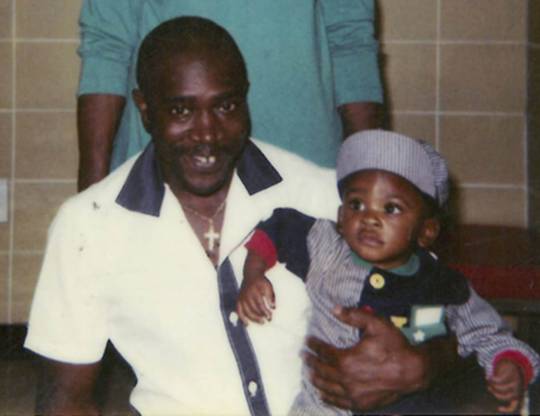
Many of these words were taken from an email by Mary Catherine Johnson to members of GFADP
As I sit here on Monday, September 25, hope remains alive that Keith “Bo” Tharpe will be granted relief from the courts or clemency from the State Board of Pardons and Paroles. He has some compelling legal issues that you can read about in the article links at the end of this post. His clemency hearing is scheduled for today. But this timing could not be more painful for his family. Should the execution occur tomorrow, it will be 27 years and 1 day since Mr. Tharpe’s crime occurred on September 25, 1990 - the murder of his sister-in-law, Jaquelin Freeman. So, in writing this, I also remember Bo's victim and her family.
Keith Tharpe is known by his friends and family as "Bo."
Bo is surrounded in love and support by a large family and many friends. Many of these people will be with him on Monday and Tuesday during visitation at the prison.
Bo married his high school sweetheart, Migrisus Freeman. Together, they had four daughters: Kesha, Melissa, Candice, and Brittney, in addition to Tameka, Bo’s daughter from a previous relationship. Friends and family remember Bo as a family man and loving father, who enjoyed spending time with his wife and children.
Bo has an exuberant personality that fills whatever room he's in. Gregarious, loving, friendly and generous are words frequently used to describe him. He loves to talk and visit, and he derives energy from others. One of his friends testified that it was good to have Bo around because he always makes you smile.
Bo is a devout Christian. He was recently baptized again with water that a friend brought back from the Jordan River, which gave Bo a lot of comfort and joy. His faith has sustained him through this extremely difficult time.
Bo has used his time in prison to overcome his addictions to crack cocaine and alcohol, commit himself to God through Bible study and conversations with spiritual advisors, accept full responsibility for his choices and actions, develop deep remorse for those he caused pain, reconnect with friends and family whom he alienated with his crack addiction and crime, build a community of friends both inside and outside of prison with whom he shares his faith and life lessons, and learn to walk God’s path.
Bo suffered an early addiction to crack cocaine, a drug that would quickly ruin his life and the lives of many people around him, including, most tragically, Jackie Freeman’s. Even before he was born, Bo was exposed to alcohol: his mother drank liquor and beer every day of her pregnancy with Bo. After he was born, alcohol remained a central part of his everyday life. Throughout Bo’s childhood, neither parent worked steadily, but instead drank excessively and ran an illegal moonshining business out of their home. Bo’s sister Audrey had this to say: “There were family members that Keith just didn’t come around when he was using. When he did, it was like his character had changed. . . . That was not the normal Keith, not the loving and kind Keith who cared deeply for his family. The drugs don’t excuse what he did, but I also know that the way Keith behaved on drugs wasn’t who he was as a person before, or who he is now.”
Bo wishes more than anything he could take back that day and give back Ms. Freeman’s life. Many of the family members affected by this senseless crime still support clemency for Bo. The timing of Bo’s clemency proceedings has been especially painful for the families, given that his hearing is scheduled for the 27th anniversary of Jackie Freeman’s death. These victims know that Bo must be punished, but have witnessed his change and growth after overcoming his addictions and committing his life to God, family, and friends. They know that Bo Tharpe today is not the same man who committed this horrible crime.
Bo conducts himself with humility. He treats both the staff and other inmates with respect and generosity and, drawing on his own experience and mistakes, acts as a positive, peace-promoting presence in the prison.
When Bo was asked if he had a message for his supporters, he said to tell everyone that he really appreciates all of your love and support - that he could feel it surrounding him. He said, "Tell them I love them, that it means a lot. I'm gonna get through this. God is with me. God is good."
Bo’s hardship began early on, with a difficult childhood complicated by addiction - an addiction that was primarily a result of his parents’ addictions. His addiction led to a violent crime for which he feels much remorse. He was convicted of this crime by a racist jury - one that called him n*gger in the courtroom, one that doubted his ability to have a soul because of his race, one that claimed they wanted him to receive the death penalty because of his blackness.
This is why Bo deserves to live. This is why all prisoners on death row deserve to be looked at in the fullness of their humanity. It is never an easy, straightforward story of a hardened criminal. Often, it is a story like Bo’s - full of early childhood trauma that led to addiction and crime. This is a place where our world is broken. And we have an opportunity to heal it, even if just a tiny amount, by allowing Bo to live.
TAKE ACTION (WHAT YOU CAN DO):
1. Text RESIST to 50409 to fax Gov. Deal.
2. Call Gov. Deal at 404-656-1776.
Tell him you oppose the execution of Keith Tharpe, and that you encourage him to put pressure on the Board of Pardons and Paroles to stop the execution.
3. Share this post or facts from this post about Bo to tell his story.
4. Share the articles below.
Use the hashtags: #KeithTharpe #notinmyname #endthedeathpenalty
5. Contact the Georgia Board of Pardons and Paroles.
Tell them you are calling for Keith Tharpe’s death sentence to be commuted, that you express deep concern at evidence of a juror’s racist views uncovered on appeal and at the fact that the courts did not consider it because of procedural issues; Emphasize that you are not seeking to downplay the seriousness of violent crime or its consequences.
State Board of Pardons and Paroles
2 Martin Luther King, Jr. Drive SE, Suite 458,
Balcony Level, East Tower,
Atlanta, Georgia 30334-4909, USA
Fax: +1 404 651-6670
Email: [email protected]
Salutation: Dear Board Members
Articles to share:
[1] Why I Believe the Supreme Court Needs to Stop This Georgia Execution http://www.esquire.com/news-politics/a12235095/keith-tharpe-georgia-execution/
[2] Ga. Is Going to Execute a Black Man Convicted by a Racist Juror https://www.theroot.com/ga-is-going-to-execute-a-black-man-convicted-by-a-raci-1818677795
#KeithTharpe#endthedeathpenalty#deathpenalty#abolishthedeathpenalty#Georgia#criminaljustice#justicereform#racism
3 notes
·
View notes